FRIDAY


FRIDAY

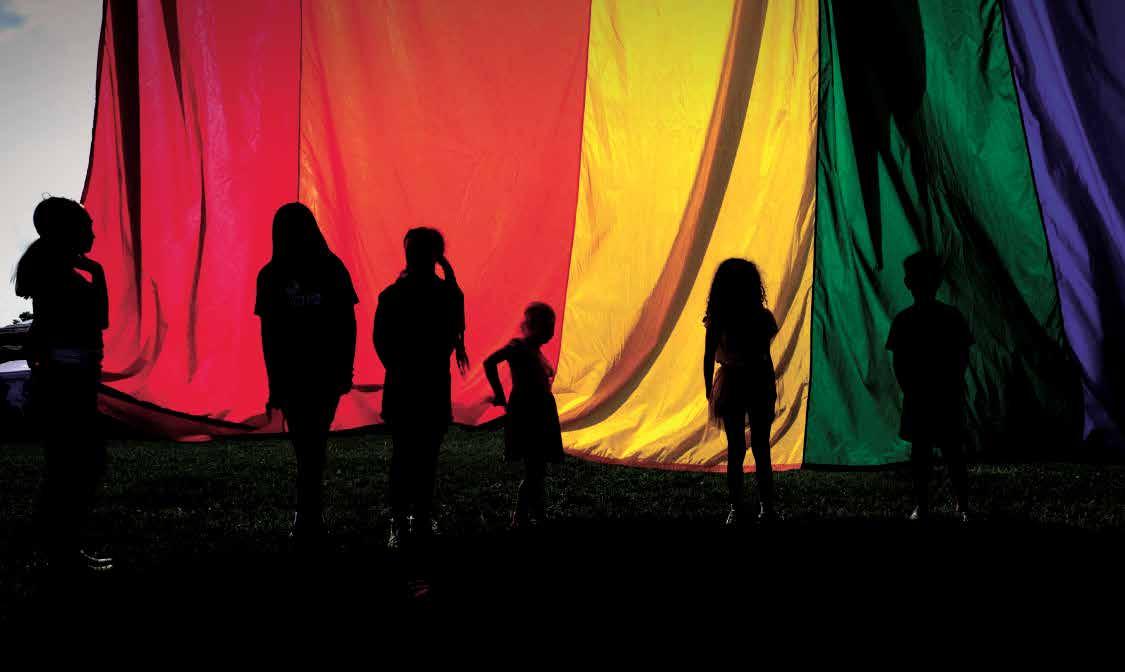 BY KALI HERBST MININO SGN CONTRIBUTING WRITER
BY KALI HERBST MININO SGN CONTRIBUTING WRITER
On behalf of 10 plaintiffs, the ACLU of Washington, Legal Voice, and QLaw filed a lawsuit against the State of Washington challenging I-2081, called a “Parents’ Bill of Rights,” on Thursday, May 23. The goal of the lawsuit is for the court to issue a permanent injunction, preventing I-2081 from becoming effective on June 6.
I-2081 would grant parents a total of 15 rights, including but not limited to examining textbooks and curricula, access to their child’s medical and mental health records, notification of when the child is offered medical care, and the option to receive notice and opt out of assignments related to sexual activity, family beliefs, morality, or political affiliations. One of the concerns outlined in the lawsuit includes the deterioration of privacy for LGBTQ+ youth who do not live with affirming families.
 BY HANNAH SAUNDERS
SGN CONTRIBUTING WRITER
BY HANNAH SAUNDERS
SGN CONTRIBUTING WRITER
While the federal “Don’t Ask, Don’t Tell” policy was repealed in 2011 and has increased opportunities for LGBTQ+ people to serve in the armed forces, the Washington Department of Veterans Affairs (WDVA) is still picking up the broken pieces that shattered the lives of many LGBTQ+ service members.
Connecting veterans to their earned benefits and services is a top priority for Robin Lang,
the WDVA’s LGBTQ+ veterans outreach coordinator, a position created by the legislature during the 2020 session. As a combat veteran who served in Bosnia, Iraq, and Afghanistan as a medic and healthcare worker, she jumped at the opportunity to apply.
“You would not believe the number of times I’ve cried reading people’s pleas to me,” Lang told the SGN. “There’s people out there who think they’re not a veteran because they’ve been told, ‘Hey, you’re not a veteran.’”
“It broke my heart” Spokane
teacher shamed,
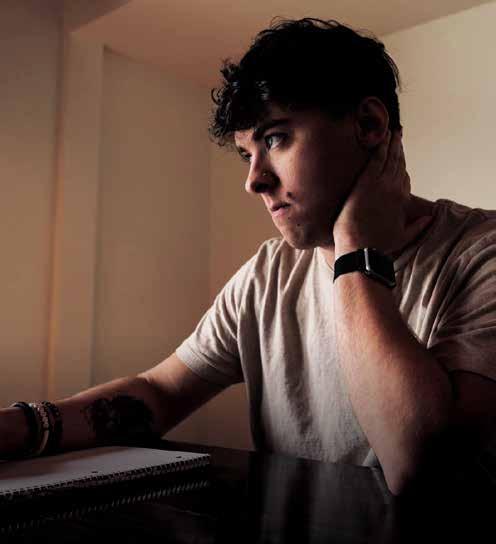 BY LINDSEY ANDERSON SGN STAFF WRITER
BY LINDSEY ANDERSON SGN STAFF WRITER
When Jacob Knight started teaching at Brentwood Elementary in Spokane, he was immediately recognized for his passion and dedication to helping students thrive.
After just one year teaching fifth grade, the new hire and district alum was awarded Spokane’s coveted Teacher of the Month Award, appearing in a segment on the local news station that reaired throughout his second November with the school.
After only a couple of years, Knight amassed a reputation with students and parents, who vied to earn a spot in his class. “It was validating to be passionate about something and have people see that I was good at what I was doing, really early on too,” Knight said in an interview with the SGN. “I had a lot of support from my coworkers, colleagues, and administrators, and the parents in my community. Within two years, I got a big reputation for being an out-of-the-box teacher.”





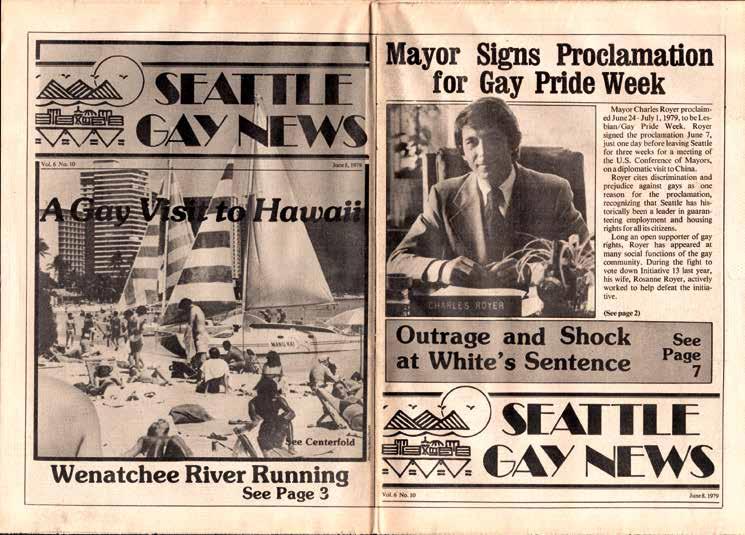


Mayor Charles Royer proclaimed June 24–July 1, 1979, to be Lesbian/Gay Pride Week. Royer signed the proclamation June 7. […] Royer cites discrimination and prejudice against gays as one reason for the proclamation, recognizing that Seattle has historically been a leader in guaranteeing employment and housing rights for all its citizens.
Long an open supporter of gay rights, Royer has appeared at many social functions of the gay community. During the fight to vote down Initiative 13 last year, his wife, Rosanne Royer, actively worked to help defeat the initiative.
Editorial: This March is Going to be One Hell of a March
Mayor Charles Rover has made it official — Seattle will have Lesbian/Gay Pride
Week in recognition of the efforts of gays throughout the nation to enact gay rights legislation.
With Royer’s support, and the support of The Dorian Group and the Royal Court, this year’s gay pride march promises to be the largest and best march Seattle has ever seen.
We hope that Carter may take a lesson from the Mayor of Seattle and the mayors of other cities, who have the courage of conviction to stand up in support for what they believe is right. Mayors in San Francisco, Los Angeles, Philadelphia and Minneapolis are all expected to proclaim Gay Pride Week, if they have not done so already.
Last year both The Dorian Group and The Court kept a low profile during the march because they felt it better served
the fight against Initiative 13 to do so. This year, rising from the resounding defeat of 13, both gay organizations are making plans to march proudly, to show Seattle that there is no longer any need for gays to pass themselves off as straights.
This year more than any other year gays are organizing together to commemorate Stonewall ‘69. With a gay rights bill before the national legislature, gays on radio, in the streets, on TV and in Time, our visibility has never been as great as it is this year.
To further increase this visibility and attract attention of the straight press, the local march is planning to make a considerable donation of canned food to the Food Bank. The committee is asking everyone coming to the march to bring food to show Seattleites that gay people can make a very real contribution to the quality of life in the city.
A change in leadership is underway at Seattle’s Real Change newspaper. May 13 was the first day for Krystal Marx as interim executive director while the publication’s board conducts a national search for a permanent leader. Marx is in the running, and she is keen on landing the position.
“The board is conducting a very thoughtful process that incorporates staff and vendor input as well,” she said. “While I am interim, my goal is to help keep everything stable.”
The vendors Marx mentions are the people who stand on sidewalks and street corners selling Real Change. With a new edition being published every Wednesday, the process works as follows: low-income and homeless vendors purchase copies of the paper for 60 cents each and sell them for $2 each, pocketing the $1.40 profit in cash or through the Venmo mobile payment service. Real Change serves over 600 vendors annually, with around $1 million going into vendors’ pockets every year.
That Real Change grew to become an institution in Seattle is something that Marx intends to continue, and with great enthusiasm.
“It’s about time that people remember that, and I look forward to helping jog that memory,” she said.
Community and family Marx has provided her leadership to Seattle’s LGBTQ community as well. As an out and proud Queer woman, she was the very first executive director of Seattle Pride (2019–22).
“I loved it there. It was great,” she said. “As a Queer woman, it was really important to me that I could work somewhere that would acknowledge my whole self and that it would be okay for me to live as exactly who I am. They took a chance on me, and with the help of the community, I was able to grow it into a four-person organization that operates year-round and with really good programs.”
On the side, Marx provides free community-identified training to LGBTQ groups, such as bystander intervention and selfdefense. She counts the Sisters of Perpetual Indulgence, Abbey of St. Joan-Seattle, among her past students.
She is also quite proud of her Transgender son, who just turned 17 and officially had his legal name changed to Ethan on May 1 — the name he would have been given if he had been born biologically male.
“I’m so excited. He’s stepping into himself and that’s great,” said his doting mom.
Personal experience
Real Change debuted in 1994, so it is celebrating its 30th anniversary this year. Marx was 10 years old that year; just two years prior to that, the eight-year-old was experiencing homelessness with her mom in Aberdeen, Washington. Marx said she will never forget the sense of danger she felt constantly. When she was taken to Bellevue to live with her dad, her eyes were opened to the great divide that exists between housed and unhoused people.
“There was this big culture shock, and I saw how different life was with just access to resources and basic things like food. That sparked something in me for the rest of my life,” she said. “I will never forget how lucky I felt to move into a safe place to live.”
This now contributes to her passion for Real Change and how the organization respects, listens to, and hears its vendors and all the people for whom the newspaper exists.
“I have always loved Real Change, because the focus is on vendor empowerment as led by vendors. There is an advocacy bent to every-
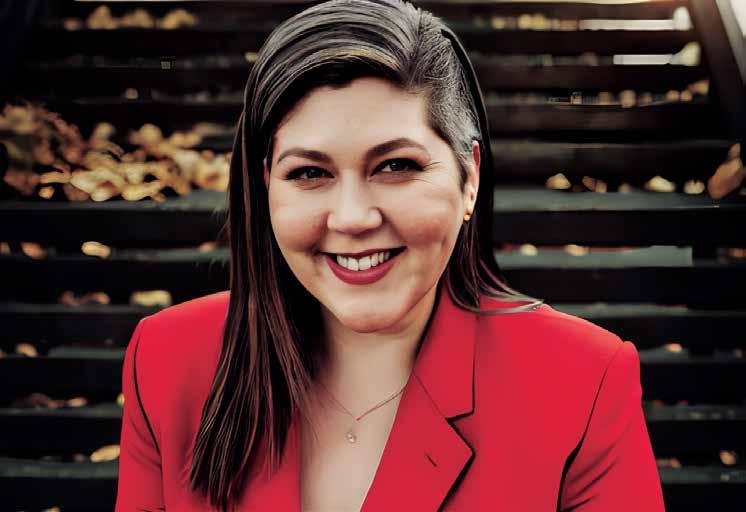
thing we do. The three things we focus on are jobs, journalism, and justice,” she said.
Marx is also appreciative that the paper is hyperlocal, focusing on issues and events happening every week.
“You’re going to pick up a copy of Real Change and see something related to advocacy, housing and homelessness, arts and culture… It’s a really nice thing to hold it in your hand and know that you are investing in Seattle every time you invest that $2.”
Burien and homelessness
Marx served on the Burien City Council from 2018 to 2021 and as deputy mayor from 2019 to 2022. She did not win her reelection but maintains a close watch on the council regarding its treatment of the homeless. Earlier this year, it voted to create a 500-foot camping buffer zone around schools, daycare centers, senior centers, parks, libraries, and sidewalks that is in effect 24 hours a day, seven days a week.
The council has also banned unsheltered people from sleeping in any public spaces between 10 p.m. and 6 a.m.; this includes any indication of camping clearly visible. The city has been roundly criticized for these actions and for not putting up additional shelter beds.
“It’s horrible. They don’t deserve a second of good press,” Marx said. “It’s clear, at least in Burien, that folks are wanting to try a different approach to a lot of the issues we’re facing, and unfortunately, we’re seeing what that approach looks like right now, with the three lawsuits against the city and encampments growing at a rapid pace.”
While on the council, Marx served on the Seattle-King County Board of Health, where she helped to repeal the county’s “helmet law,” citing its discriminatory nature against the homeless, who are at risk of not having a bicycle helmet for legitimate reasons.
“Being ticketed for not having a helmet that could have easily been stolen or destroyed would be incredibly damaging and detrimental to so many people, not to mention Black and Brown communities that would get pulled over at disproportionate rates,” she said.
“You’re going to pick up a copy of Real Change and see something related to advocacy, housing and homelessness, arts and culture… It’s a really nice thing to hold it in your hand and know that you are investing in Seattle every time you invest that $2.”
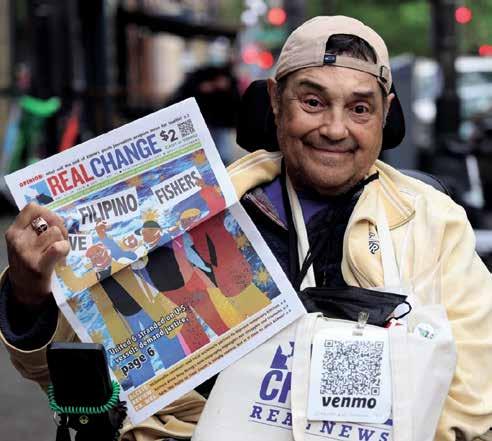
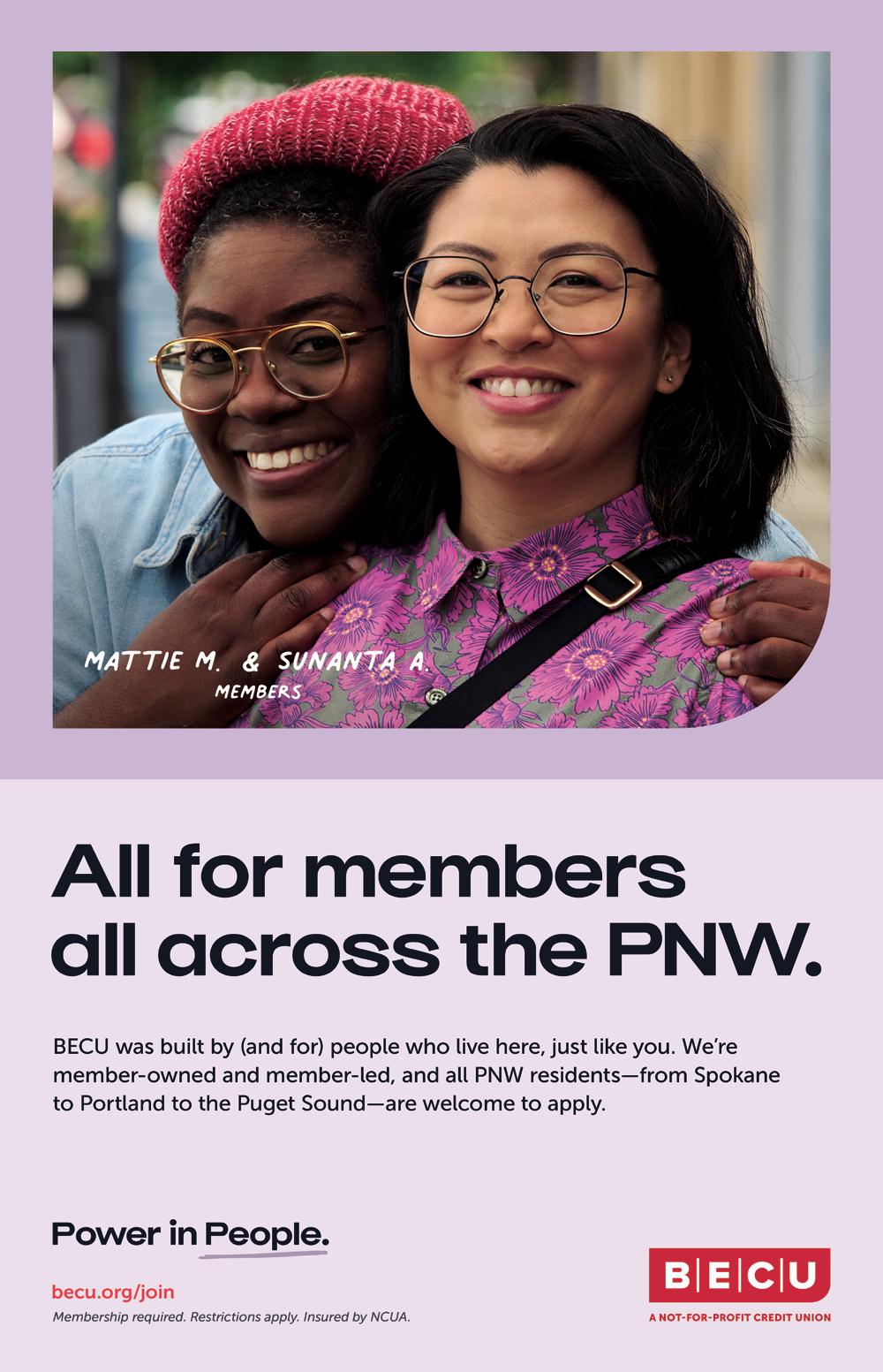
Since being unveiled, the Progress Flag crosswalk by Kirkland’s Marina Park has been damaged at least four times by spinning car tires, paint, and graffiti. The Kirkland Parks & Community Foundation (KPCF), Amazon, and the City of Kirkland are partnering to repair and resurface the piece with methyl methacrylate, a more durable material that is easier to mend and regularly used on the city’s bike lanes and crosswalks.
The KPCF is raising funds via its website, with a goal of $5,000, and Amazon is adding three dollars to every one donated.
Erika Mascorro, diversity, equity, inclusion and belonging manager for the City of Kirkland said the goal is to repair the piece before June 7, the day of the City’s Pride event at the park, though progress on the project is contingent on the weather and availability of materials.
“The City would like the LGBTQIA+ community to know we believe that everyone has the human right to love who they choose and [that] we support the community. The City will always uphold its strong values of being a safe, inclusive, and welcoming community where everyone feels like they belong,” Mascorro wrote in an email to the SGN
The project aligns with the Kirkland City Council’s goals for 2023 and 2024, one of which is creating inclusive and equitable community; a flyer about the goals specifically lists gender identity and sexual orientation.
Kirkland’s community Pride celebration will be held on June 7 from 5 p.m. to 7 p.m. in Marina Park. It is open to all ages and will feature free refreshments and a resource fair. There will also be an afterparty at Moss Bay Hall starting at 7 p.m.

While there’s no magic bucket of LGBTQ+-specific benefits, Lang fills in the gaps the federal Veterans Administration (VA) leaves behind.
“I offer the same benefits that every veteran has earned. Really, the only difference is I’m that trusted voice — that trusted person and advocate,” Lang said. “The most common issue I get is folks that were excellent airmen, soldiers, [or] sailors, but they got kicked out just shy of the date that allows them to qualify for benefits.”
The VA offers disability benefits, highereducation financial assistance, and housing certificates. If members don’t have enough time served — which varies but is generally two years — they cannot qualify for these benefits.
“It’s disheartening,” Lang said. “I get someone that comes to me with 18 or 17 months of service. They’ve got their certificate from basic training saying they’re an outstanding individual. They have all above-average ratings, but during that time, they get found out … A lot of the times, the story I have is that someone stole their diary and outed them, so they get kicked out [under the ‘Don’t Ask, Don’t Tell’ (DADT) policy]. They were planning to serve longer when the military discharged them, and they can’t qualify for those VA benefits.”
The legacy of DADT In 1982, the Department of Defense released a policy stating that “homosexuality is incompatible with military service.” Between 1980 and 1990, about 1,500 service members were discharged annually on the basis of sexual orientation.
In 1993, President Bill Clinton signed the “Don’t Ask, Don’t Tell” policy into law, which allowed Queer Americans to serve in the military, and they would not be asked about or required (or allowed) to reveal their sexuality. In 2011, President Barack Obama signed the congressional repeal of the policy into law, allowing LGBT persons to serve openly.
According to the VA’s veteran population data, there are 551,512 veterans living in the state. With 7.6% of the US population identifying as LGBTQ+, the WDVA estimates that there are about 41,000 LGBTQ+ veterans in the state.
Lang assists with military records corrections, including changing discharge papers to reflect the person’s current legal name, trauma-informed and culturally aware assistance to access state and federal VA benefits, and discharge upgrades for those who experienced adverse actions under DADT.
For DADT discharges, there is no automatic upgrade that would allow for former service members to obtain their benefits.
Lang said people would have to request an upgrade and make their case, which is both retraumatizing and time-consuming. Lang said although she assists people with documentation, they are still forced to recount their service experiences.
With Pride season around the corner, Lang plans to attend outreach events, including Capitol Hill PrideFest and SeattlePride in the Park, among others, to connect with LGBTQ+ veterans about benefits. Lang wants the LGBTQ+ veteran community to know that she is here for you.
If you’re an LGBTQ+ veteran who was discharged under DADT and never received benefits, contact Lang at robin.lang@dva.wa.gov.

Among the plaintiffs is the nonprofit Oasis Youth Center in Tacoma, which provides drop-in services for LGBTQ+ youth. The lawsuit says schools help connect students to Oasis through referrals.
“For many youth that Oasis works with, the school environment is one of the only places — other than Oasis — where they encounter adults who affirm their LGBTQ+ identity, offer access to mental health support, or refer them to other needed serves,” the lawsuit reads.
Denise Diskin, attorney for QLaw Foundation, shared a similar concern in a press release.
“Initiative 2081 is a forced outing law that will harm LGBTQ+ students if implemented in our schools. LGBTQ+ students seek out, safe, and trusted school staff when they don’t have a supportive home, and the affirmation they receive can be lifesaving. I-2081 undercuts this and other vital resources at a time when youth need support the most.”
The lawsuit’s primary argument, however, is that I-2081 violates the Washington State Constitution. It specifically points to Article II, Section 37, which requires full-
length identification of laws being changed by new legislation. In other words, the plaintiffs allege that I-2081 did not include language disclosing modification of existing laws.
One of those cited is RCW 70.02.130, which keeps healthcare providers from disclosing health information without consent from the minor. The lawsuit says I-2081 would contradict the law by giving parents access to student medical records. Other laws the lawsuit specifically points to regard parental notification at youth shelters and opt-out notices for coursework. The lawsuit notes, however, that “in order to determine all of the laws impacted, a thorough search
of existing laws is required to fully understand the Initiative’s effects.”
Adrien Leavitt, staff attorney for the ACLU of Washington, said in a press release that I-2081 has only caused confusion.
“Article II, Section 37 of the Washington Constitution is designed to ensure [that] a proposed law’s full intent and impact on current law is clear, but I-2081 has only caused confusion. The initiative passed because of deception and confusion, and it will cause life-altering negative outcomes for queer and trans students if it is implemented.”
To ensure that Washington remains a safe place for LGBTQ+ people, Janet Melman is running for the 42nd Legislative District, which encompasses Bellingham — where she lives and which she describes as Queer friendly — and Ferndale. If elected, Melman would become the first Transgender person to serve in the state legislature.
“Our rights are only as guaranteed as our lawmakers can protect them for us, and that’s why a Trans voice needs to be in Olympia,” Melman told the SGN
One of the primary reasons she entered the race was because of the passage of Initiative 2081, which has the potential to out Queer youth to their parents and guardians.
“A sitting senator told me last year that they believed that Trans people aren’t working hard enough to be accepted,” Melman said. “If that’s the attitude in Olympia, how can we expect them to defend our rights?”
Melman said if legislators who claim to be LGBTQ+ allies think like this, there needs to be someone at the table who knows the truth, and the lived experiences of Trans people — both good and bad, adding that those wishing to roll back the rights
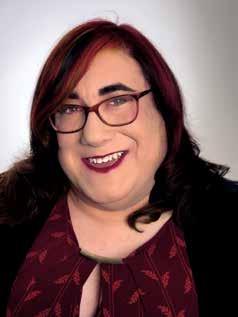
of LGBTQ+ people affect all Washingtonians, not just those who identify as Trans. Although she has a degree in biosciences, Melman has spent years as a healthcare and LGBTQ+ rights advocate, which has led her to cultivate relationships with lawmakers in Olympia and Washington, DC. She believes if she can advocate for herself as
a woman who is Transgender, then she can do so for others.
Uphill battle
In early 2022, Melman realized she was Trans, she said.
“It took me until December of that year to basically come out fully and start living my life daily as my true self,” she said. “One of the things that gave me a lot of insight is that there was no one helping me figure out how to get healthcare, what I need.”
Now with the increased knowledge of navigating different aspects of the state’s healthcare system, Melman hopes to pay it forward.
“My passion is to literally take my knowledge and share it with other people so that they don’t have the fear and anxieties I had by doing everything myself,” she said. Her biggest challenge with her campaign so far has been outreach and letting community members know what’s at stake in this election.
“I don’t think this is an issue of apathy. I think this is an issue where people just don’t get that word. They don’t hear about it, so they think it’s just another election cycle, and there’s more to it than that,” Melman said.
Melman’s opponents in the 42nd Legislative District include the incumbent
Democrat, Alicia Rule, and Republican Raymond Pelletti. Melman said she feels like she is being shut out of the race, however. During a recent endorsement call, where she and Rule were trying to earn endorsements from a local group, an question shook her.
“The first person asked a question, and it was supposed to be for both candidates, and the question was: ‘We worked very hard to flip this district for Democrats. Why do you want to ruin it for us?’ Which, of course, was not a question that was directed at both candidates, but once they said it, I was cooked,” Melman said. “I was sabotaged in that call, and I knew that if I was not going to get local support, I was going to be forced to run as an outsider.”
Although frustrated, Melman is fighting the uphill battle. She believes that constituents are more inclined to vote based on their beliefs. She also thinks that when voters are told that someone [else] is your party’s only candidate and if you don’t vote for them, you get what you get, then it isn’t democratic.
To learn more about Melman’s campaign, visit https://www.janetfordistrict42.com.
Montana native James DeHart is campaigning for position 2 in the 35th Legislative District (Mason County, and parts of Thurston and Kitsap Counties). After his opponent and current incumbent, Travis Couture, testified in March at a hearing regarding I-2081 — which has the potential to out LGBTQ+ students to their parents — DeHart is more fired up than ever. During Couture’s testimony, he spoke about a grade-schooler who was questioning their gender. “[Couture] went after them like they were another anecdote for him to use in a hateful speech, and unfortunately, the Republican Party tends to… demonize certain groups,” DeHart told the SGN. “Making schools safer for children who are questioning or who have come out — that is a huge thing for me. We need to make sure these kids are protected, not just from bullies at schools, but from the possibility of abusive parents.”
DeHart, who has lived in Washington since 2006, found a love for public service through his mother, who was a 27-year elected official in Montana, and through his own work in government. The candidate has experience working for seven state and local agencies, ranging from social and health services to transportation, early childhood education, and child welfare. DeHart currently works for the Washington State Gambling Commission.
This isn’t DeHart’s first campaign, however. In 2022, two years after moving to the 35th,
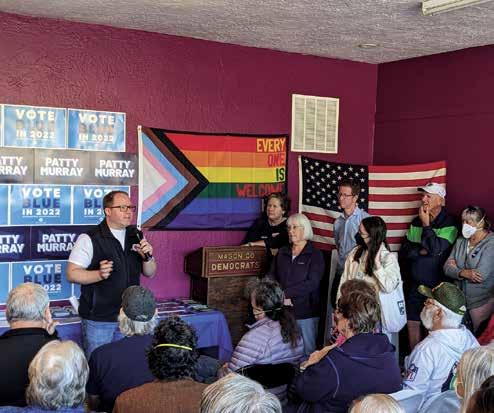
he ran for this position against Dan Griffery.
Although he lost, he garnered 43% of votes. If elected this fall, DeHart hopes to improve the district’s dilapidated infrastructure and education, including addressing I-2081.
“I want to start carving holes in this ridiculous initiative and make it so children can feel safe talking to their counselors, because
if this doesn’t go away or we don’t get rid of that requirement, kids aren’t going to talk to their counselors,” DeHart said. He noted how this initiative — which will automatically go into effect on June 6, one day before his birthday — is so personal, as it relates to LGBTQ+ students questioning their identities.
“I disagree very, very much, especially with the parents having the right to see what their children’s counselors are writing,” DeHart said. “I have a big problem with that, because in almost every other situation, going to a counselor would be a confidential service. If you out somebody, you irrevocably change that person’s life.”
Telling someone that you’re Queer is not something to be taken lightly, DeHart added.
“You continue to do it throughout your life. I still have to come out to people, and I’m 42 years old,” DeHart said.
Growing up in Helena, Montana, DeHart felt the lack of protections, and said that he really could have used them — particularly as a questioning child at the time.
“You have to protect every child, and sometimes parents are the perpetrators of abuse, and not the ones that protect the child from abuse,” he said.
DeHart said he has dealt with LGBTQ+ discrimination in the past and has relatively thick skin.
“I have many reasons for running. My community is one of those reasons. The fact is that there are Gay people in my district who have never had an elected official that was of LGBTQ status. I know if I…would’ve seen a Gay elected official, I would’ve felt at a younger age that ‘Wow, that can actually work out for me.’”
To learn more about DeHart’s campaign, visit https://www.dehart4wa.com.
 BY KALI HERBST MININO SGN CONTRIBUTING WRITER
BY KALI HERBST MININO SGN CONTRIBUTING WRITER
Pacific County will hold its third-annual Pride celebrations in Raymond and Long Beach on June 22 and 23, respectively. The two rural towns have a combined population of just under 5,000 — but don’t let that fool you: the county’s month of festivities will include a drag fundraiser, a Pride parade, kayaking, bingo, lots of live music, and spaces for small businesses.
The celebration started as a small private dinner party eight years ago, but it became a larger public event after cocoordinators Jovon Vaughn, Jeff Karnatz, and Jessica Marie Porter noticed a growing need for LGBTQ+ visibility, especially as negative rhetoric about drag queens became more common. Vaughn, who is also the executive director of the Willapa Harbor Chamber of Commerce, a Raymond city council member, and the owner of two businesses, attributes the ability to make Pride happen to the various roles LGBTQ+ community members play.
“Over the last three to four years, we’ve had large groupings of LGBTQIA families moving into our community,” Vaughn said. “It’s one of the elements as to why we can [put on] Pride [events]. Most of the people involved in this have [worn] many hats.”
Originally, the event was intended to be one day long, but the varying demographics of each town called for different kinds of celebrations. Vaughn says that Raymond, in the north, has a lively workforce, while Long Beach is more tourism-focused.
“We created this difference in kind of the way that each area celebrates,” Vaughn said. “In the north end of the county, you’re not celebrating on a Tuesday.”
Family oriented
As for the celebrations, the co-coordinators have taken a family-oriented approach. Vaughn described it as a “Gay family picnic,” with a beer garden in one corner and a bouncy house on the other.
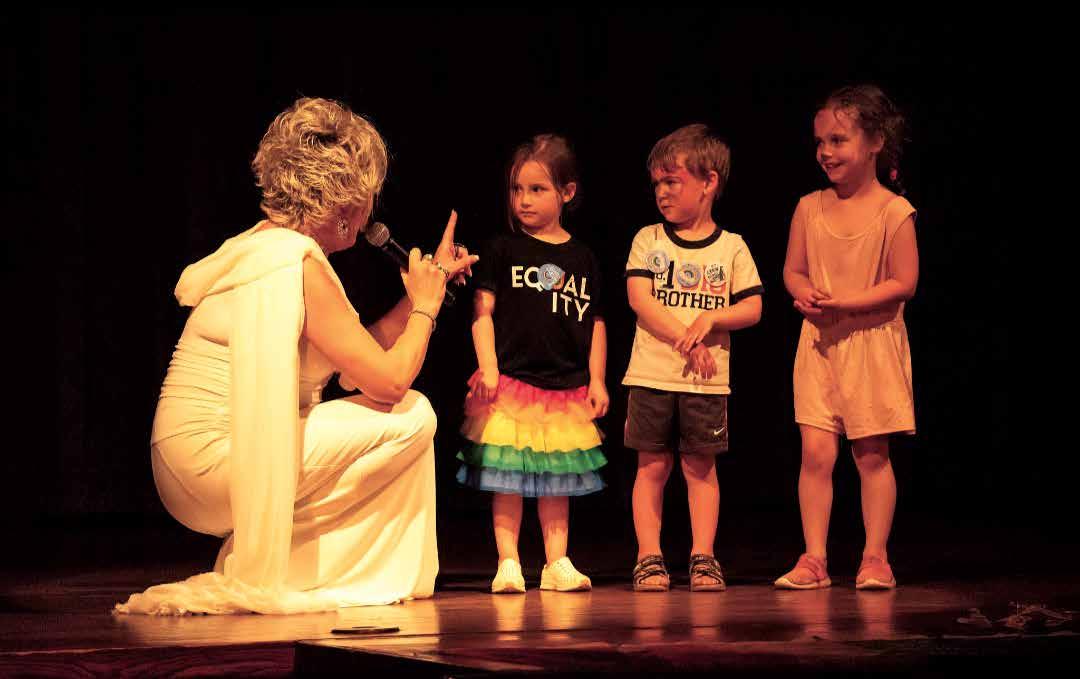
“We aim for it to be family-friendly — I know that’s such a weird heteronormative word to use, but we use that to say, ‘As much as we appreciate and love all of the colors of the rainbow, we have to recognize where we are,’” he said. “I want…everyone in the family have something that they’re able to enjoy.”
So far, the approach has worked, and the larger community has accepted the celebration over time. Vaughn says it was originally challenging to get a local nonprofit for motorcycle enthusiasts to participate, but the group now handles the festival’s security for free. Last year the festivities attracted 14 protesters, who were far outnumbered.
He talked to the protesters too, on the back of a flower truck with a loudspeaker.
“Watching my community walk behind me on top of this rickety flower flatbed truck with my speaker and a little group of protesters, but looking down the street and seeing four hundred people in the street, and probably another hundred on the side of the street all rainbow-flag waving and clapping — that’s who we really are,” Vaughn said. “That one and a half percent, that little tiny group of people didn’t impact the experience at all for any of the kids, any of the people who were part of it.”
Vaughn thinks that maybe it’s small rural communities where it’s easiest to create the most change.
“For visitors that…are willing to take the trip down and celebrate with us, it will show [them] that not everything [they’re] reading and seeing on the TV and the internet and everywhere else [where] we’re being told that there’s all these divisive issues, that’s not true everywhere,” he said. “There is a community of people who are excited to get to know you and they want to know you. They may not do it perfectly, they may fumble trying to be welcoming, but it’s always from the place of trying to open their arms to you instead of trying to raise their arms against you.”
Everything changed when he began coming out, first just to himself. “I started noticing that I was being treated differently actually about, I’d say, fall of last school year. I just started speaking out a little more often, questioning why we did certain policies,” Knight recalled. “Then, I started noticing I wasn’t invited to all the special meetings anymore.”
Coming out
Knight wasn’t a stranger to the way things happen in the Mead School District. Attending K-12 as a student in the 2010s and then returning to teach in his early twenties, he saw the looks some teachers would pass whenever LGBTQ+ topics were mentioned. At the start of the 2023 school year, a motivational speaker attended one of the staff’s training events. “When she announced that she’s Queer, the entire room just went silent. I could feel the tension of all the Christian educators in the room feeling uncomfortable,” he recalled.
Still, when Knight looked into the eyes of his students, he saw the potential for a better future. Students and parents loved his community teaching approach. Every Monday, he’d check in, prompting them to share “highs” and “lows” from their weekends. In the past, Knight had begun these discussions by bringing up his own adventures, which often included his wife. Mention of his opposite-sex partner never sparked backlash or controversy — students and faculty celebrated and brought Knight gifts on the eve of his wedding.
In 2023, he was no longer with his wife but still led classroom check-ins by telling the students about dates he went on with his new partner. “I strategically would drop hints that my partner and I went ice skating, or my partner and I did these things, and I did this over a couple weeks, just bracing,” he said. The students would come to class excited to hear more updates about Knight’s new partner and often used she/her pronouns to describe this person.
“I said, ‘Yeah, you guys, how would you feel if it wasn’t a ‘she’ but a ‘he’?’ and one of the students asked, ‘So, does this mean you’re Gay?’ And I was like, ‘Yes, it does mean that,’ and I showed a picture of my partner, and that was the last time I ever talked about me being Gay. That was it.”
That same week, Knight was called into the principal’s office and given a strong warning to be careful when sharing about his personal life. Knight proceeded with caution. He began wearing a Pride wristband but did not share any more photos or stories about his boyfriend. A couple weeks later, complaints from parents continued to roll in. For the rest of the year, Knight stayed quiet.
May rolled around, and Knight prepared to send his students to middle school as kinder people. In a final act of pride, he added a rainbow flag to his collection of Spiderman and Whitworth posters. “I didn’t hear much about it, and then the last day of school, it was brutal,” he recalled. Just as he was closing his room for the year, Knight received an email from an enraged parent. “I was really surprised, because he sent this whole long homophobic email telling me how I needed to be representing Jesus better, that my Pride flag and my dating life were not representing that,” he said. Knight immediately contacted his boss regarding the email, and was informed that the situation would be dealt with. He received no updates over the summer. When he returned for the 2024 school year, Knight contacted the principal to see what had been done.
His boss informed him that because the parent and Knight had previously discussed their shared identities as Christians, he had opened himself up to receive criticism. “I don’t know what that means. Just because we have something in common and we connected on that piece doesn’t give someone permission,” he said. “I’m still an educator; he’s still a parent. I’m a professional. You can’t speak to someone that way. [My boss] disagreed. She thought it was self-imposed.”
Windows, mirrors, and flags
With those words still echoing in his mind, Knight began the first day of school. As a fifth-grade teacher, he was responsible for introducing his class to American history and preparing them for their next phase of education. He always started the year by reading Ruby Bridges to his class and setting them up for an understanding of the year ahead.
“I do this every year,” he explained. “My whole speech about how we have windows and we have mirrors and we’re going to hear stories that show us people who look like us and believe what we believe, and then we’re going to have windows where we see into other people’s lives, where they might be different than us. I go down the list, I go, ‘People of color, Indigenous people, Gay people, all those things might be types of people we learn about.’”
At the end of the day, Knight was called into the principal’s office again. He recalled thinking, “First day of school — what is happening?” From across her desk, the principal told him she had already received a parental complaint. “One of the parents in my classroom, after he went to the open house and saw the Pride flag, he called the superintendent to complain and ask what the policy was for political symbols.”
The Mead School District does not currently have a policy about Pride flags.
His boss also showed him an anonymous post from an online Facebook group expressing safety concerns after learning about a Gay fifth-grade teacher. “I’m the only male fifth-grade teacher — I’m the only Gay male fifth-grade teacher — I had a Pride flag in my class. I can’t express how scary it was to see the implications that I’m unsafe,” he said.
A complaint from another parent, before the school year had even begun, read: “He also has hung a large LGBTQI+ flag in his classroom. This display is completely inappropriate for an elementary classroom, or any public educator’s classroom… Many parents feel VERY strongly about maintaining our rights and control to teach our children about social, political, and moral issues according to our standards and beliefs. This is not the right of any public educator. The LGBTQI+ movement is a very politically charged agenda…I would argue that this is grooming and even child abuse. And I cannot stand for that.”
His problems didn’t stop there. The next day, a student came to his desk with a note. “It said, ‘I’m not allowt [sic] to learn about gay people,’” he recalled. That Friday, the student’s parent sent an email, clarifying that she did not want her daughter learning about “gender, politics, or religion.”
Knight responded by sharing the state’s fifth-grade curriculum. “It’s the start of American history, which is a lot about Indigenous people, politics, religion, and gender. That’s kind of our whole history,” he said. When he returned to class the following Monday, the student was gone. Her parents had pulled her from class in favor of homeschooling.
A few weeks later, another of Knight’s students was pulled from class. His parents were considering homeschooling as well, citing offense at the teacher’s Pride flag.
At the beginning of November, the district held school board elections, ushering in a new wave of staunch conservatives. Following the election, Knight’s union president urged him to remove the Pride flag after multiple representatives used him as an example of “culture wars” playing out in Mead’s hallways. Still, Knight refused to put his flag back in the closet.
Rumors
In mid-November, Knight faced another incident. One of his students had spread a rumor around the fifth grade that spending too much time in his classroom would turn them Gay. He immediately contacted the district.
“It’s sexual harassment. I don’t care if it’s a 10- or 11-year-old — it’s inappropriate. And they handled it poorly,” he said. The student received one lunch detention but remained in Knight’s room. The week before Thanksgiving, he finally took his Pride flag down.
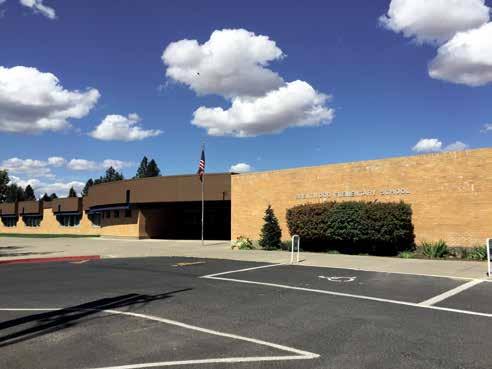
Knight thought that sharing his authenticity with the Brentwood community would show others who might feel different that they too can belong. Instead, he was harassed, falsely accused, and shamed out of the building.
“One student pulled me aside privately and went, ‘What happened to all your posters?’ And I told this one kid — and I think five or six other kids heard — but I said, ‘You know, I don’t feel safe having all of me up on the walls right now, so I just wanted to bring it all down.’ And that was the extent of the conversation.”
A month later, as Knight’s class prepared to let out for winter break, he received an email about allegations of inappropriate conduct. On the final day of the semester, when Knight and his class were to celebrate the winter holidays with a party, he was instructed not to come to school. Instead, his students would go to the office one at a time to be interviewed by a district official.
The initial concerns were that when he took his flag down, Knight told his students they could not share with their parents why he removed the flag. In the interviews that followed, students were asked about the flag but also baited with other questions, such as whether Knight favored boys in his classroom, if he encouraged the students to say, “Yas, queen,” and how often he wore pink overalls to class.
“It felt like a witch hunt,” he said, growing emotional as he recalled the event. In official documents from the investigation, the parent’s complaint also included Knight coming out to his class, which had occurred the year before and did not affect her child.
“It feels like there’s an agenda. This stuff created noise and distraction from the great educator that he is. He’s crossing professional boundaries,” the parent said.
When Knight returned to school in January of 2024, he began teaching by the book. There were no more Monday check-ins, no discussions about weekend adventures, and no creative lesson plans. The students took notice. Knight grew increasingly depressed. He started taking sick days once a week.
The final blow came in February, when Knight was investigated again, this time for making a student uncomfortable by presenting her with the option to give a “side hug” as part of a daily greeting. The hug was a part of Knight’s dismissal routine and had been encouraged by a female student’s parents, stating that she required physical contact to feel secure in school.
“I made sure to only ever offer side hugs in the hallway, in front of other teachers
and security cameras,” Knight clarified. Following the latest investigation, he was done. Knight began asking his coworkers to donate PTO to help him finish the year out until he could look for a teaching job elsewhere in the district.
Then, the district came to him with a way out. They offered to pay Knight through August if he resigned immediately and agreed not to sue. He took the deal, no questions asked.
Knight’s final day was devastating. His students cried as he tried to explain to them why he was leaving. “It was the hardest thing I’ve ever had to do,” he said. “It broke my heart.” The students were inconsolable.
With Knight gone, chaos ensued. One afternoon, a student and their parents met up with Knight for lunch. When they returned and shared their adventure with the class, the room became so rowdy that the principal and another teacher both had to come down to try and settle the students. He is still in contact with many of his students. “Once my student, always my student,” he said with tears in his eyes as he gushed about the pride he has for the kids he’s seen grow up in his room. “There’s one student I’m still in contact with, and I still call her ‘Madame President,’ because I’m still convinced she’s going to rule the world someday.”
Knight thought that sharing his authenticity with the Brentwood community would show others who might feel different that they too can belong. Instead, he was harassed, falsely accused, and shamed out of the building.
“What’s tricky about the atmosphere of Brentwood is that there’s this unspoken rule where you don’t speak up. We watch what happens,” he said.
The Range, a Spokane publication, recently broke Knight’s story. When a former coworker posted about it on Facebook, she received immediate criticism. “She wouldn’t name names, but she said after that people came to her and they were very upset that she shared that story. They took it very personally. So she spent the whole day crying. That’s the atmosphere,” Knight said.
The SGN reached out to the Mead School Board but received no response.
Knight plans to move to Seattle and search for teaching jobs again soon.
Pride Month is almost upon us, and with that comes plenty of opportunities for community and fun. Across Washington, there will be events throughout the summer, from Pride parades to learning opportunities. Have a look at the festivities highlighted here and go have some fun this month!
May 31
Snohomish Pride
May 31–June 1
Snohomish Pride is a two-day weekend festival with lots of activities for all ages, including family picnic, Pride parade, and drag shows. For more information, visit https://www.historicdowntownsnohomish. org/snohomishpride.
June 1
Paws and Pride Dog Walk
9:30am–1pm
Bring your pup to this unique event and take a stroll around Bellevue Downtown Park, or grab a brew from the beer garden and watch a drag show unlike anything you’ve seen before. This year will also feature the unveiling of Bellevue’s first creative pavement treatment.
Registration is free; however, donations are accepted and will go to Seattle Humane in Bellevue and Lambert House. To register, go to https://www. bellevuedowntown.com/events/paws-andpride-dog-walk.
Pine Street Pride
11am–3pm
Centralia will host its fourth annual Pride festival at Pine Street Plaza. This kid-friendly event will have activities, crafts, and entertainment throughout the day. For more information, visit https:// lewiscountypride.org/events.
Mariners Pride Jersey Night
The Seattle Mariners are celebrating Pride all month long, kicking it off with an exclusive Pride jersey fans can receive through an online promotion. For more information or to buy tickets, go to https:// www.mlb.com/mariners/tickets/specials/ pride.
Pride in the Park
12pm–7pm
Kick off Pride Month in Seattle with Pride in the Park, a fun, family-friendly event with plenty of things to do and see. Enjoy the variety of performances, Queer vendors, and teen space. To see a full lineup, visit https://seattlepride.org/events/ pride-in-the-park-2024.
White Center Pride Street Festival 11am–11pm
Celebrate the 5th annual White Center Pride Street Festival all day, with performances, food, a beer garden, over 100 LGBTQ+ vendors, and more! Wristbands are available for purchase ahead of time, which come with discounts on food and drinks and preferred seating. For more information or to buy a wristband, visit https://www.whitecenterpride.org/2024pride-street-festival.
Taking Pride in Capitol Hill 9am–1pm
Join members of the LGBTQIA+ community at the Plaza at Connection on Broadway and Denny (the northwest corner of Cal Anderson Park) for a fun event to clean up the neighborhood and share a meal together. Free T-shirts are first-come,
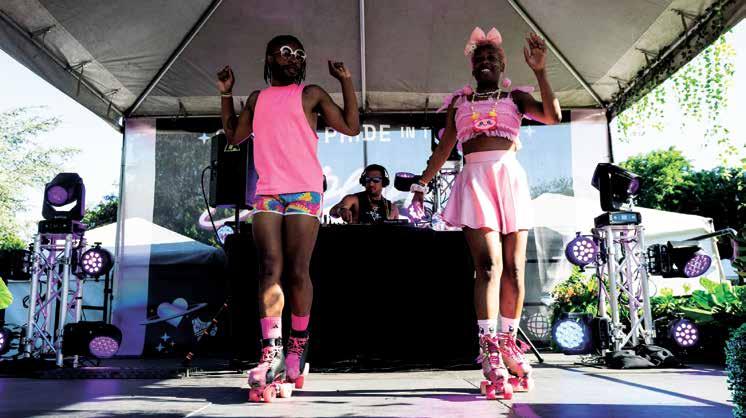
first-served! To register, visit https://www. seattlepridefest.org/schedule/2024/6/1/ taking-pride-in-capitol-hill.
June 2
Run and Walk with Pride 9am
Seattle Frontrunners will host a running and walking event to raise money for Peer Seattle. Participants can chose 4k or 8k and will receive a Brooks running shirt. Virtual participation is also available for those who prefer not to gather. To register and learn more, visit https://runsignup.com/Race/ WA/Seattle/RunWalkwithPride.
June 7
Astoria Pride Various times
Astoria Pride weekend involves numerous activities for all ages, from a pub crawl to Pride in the park. The Pride Gayla will return for its ninth year on Saturday night, with a full evening of entertainment and fun. Then relax Sunday morning at the Pride Brunch. For a full list of events and to buy tickets, go to https://astoriaoregonpride.org/ astoria-pride-2024-events.
Various times
Three full days of fun in downtown Burien! Activities will include a street dance party, an all-day street festival, and drag queen bingo and brunch. For more information, go to https://www.burienpride.com.
June 7–9
Spokane Pride
This three-day celebration kicks off on June 7, with a parade; live performances happen on June 8 at Riverfront Park. There will be activities for all ages, with a dedicated Youth Zone and Spark Pride Kids Zone.
“Our events tie a large portion of our community together,” said Matthew Danielson, executive director of Spokane Pride. “We are using Pride to revivify and create new cultural institutions that make our community more connected and a better, happier place to call home, and promote health and well-being with our vaccine clinics and health outreach activities.”
For more information, visit https:// www.spokanepride.org/pride2024.
June 8
Chelan Pride
Various times
The third annual Chelan Pride in Riverwalk Park will feature live music, vendors, a beer garden, and youth activities. If you’re looking to experience the area’s iconic wine scene, the Pour Out the Love wine tour will take you through Chelan and Manson. For more details, visit https:// chelanpride.org.
Lake Stevens Pride
Various times
Pride on the Lake is back with food trucks, vendors, live music, and workshops. It’s guaranteed to be an unforgettable weekend! For more information, visit https://www.facebook.com/ groups/165547916337045.

Olympic Pride
11am–4pm
Port Townsend will celebrate Pride in style at Pope Marine Park, with over 40 booths and entertainment for all ages. A full schedule of events is coming soon. For more information, visit https:// theproductionalliance.org/events/pride.
Woodinville Pride
12pm–4pm
The third annual Woodinville Pride will take place at Wilmot Gateway Park, promising a fun afternoon filled with performances by various artists, ranging from drag shows to poetry. Over 50 vendors will also be present, featuring art, community support, and much more. For more information and to see a full lineup of performances, visit https:// woodinvillepride.org.
Yakima Pride
12pm–6pm
Have you ever wanted to see a 130-foot Pride flag? Then you can’t miss Yakima Pride, a full day of fun, including a parade, live entertainment, food, and many vendors to explore. For those 21+, there is also an after-party starting at 8 p.m. with music, drag performances, and drinks. To learn more, visit https://www.yakimapride.org/ about.
June 9
SnoValley Pride
11am–3pm
Carnation will hold its second annual Pride Picnic at Tolt Commons, a fun, familyfriendly event with live music and crafts. There will be food provided, including vegan options, catered by the Carnation Cafe.
“SnoValley Pride is breaking the stereotype that rural areas aren’t welcoming to our LGBTQ+ residents, visitors, and allies!” said founder Gregory Jamiel. “We want people who come to our picnic to feel safe, seen, and welcomed in one of the most beautiful and relaxing places in the Seattle area.”
For more information, visit https:// snovalleypride.com/pride-picnic-2024.
Monroe Pride
12pm–4pm
The Monroe Equity Committee will host the fourth annual Monroe Pride at Skykomish River Park. Vendors, live entertainment, and games are just a few of the things to look forward to. To learn more, visit https://www. monroeequitycommunity.org/pride2023.
June 13
Mariners Pride T-Shirt Night
Celebrate Pride at a Mariners game, with a special limited-edition T-shirt. To purchase tickets, go to https://www.mlb. com/mariners/tickets/specials/pride.
June 15
Everett Pride
11am–2am
Join community members in Everett for a fun day of events. On Wetmore Avenue, explore the block party, featuring food trucks, vendors, and “the Gayest Car Show.: After that, there are three afterparties to attend, including an all-ages happening at Bayside Cafe and two 21+ events. For more information, visit https:// www.everettpride.org.
June 20
Pride Beyond BordersWhidbey Institute
7pm
Hosted by presenters from Outreach International, this event looks into the status of LGBTQIA+ rights across the world. It’s free but requires registration to ensure that everyone can be accommodated. To register, visit https:// tinyurl.com/2024Pride.
June 22
South Whidbey Pride
Starting at 12pm
March through Langley to the South Whidbey Community Center for a fun afternoon of entertainment, games, vendors, and food! There will also be a
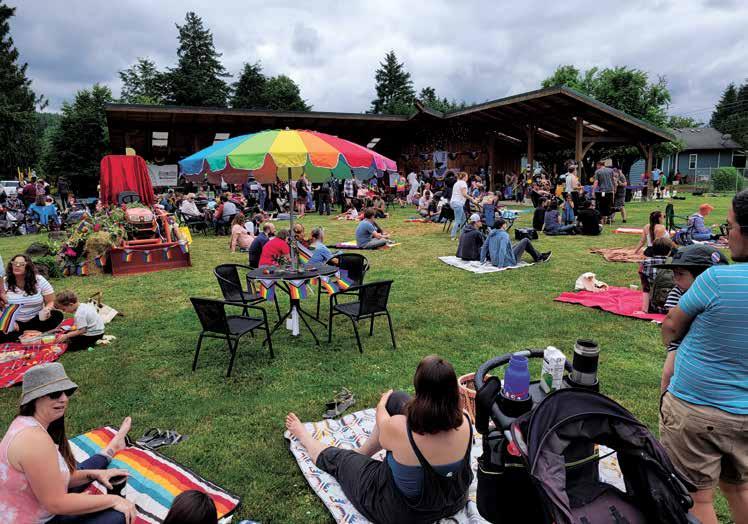
special address by Ebo Barton from the Washington State LGBTQ Commission. For more information, visit https://www. southwhidbeypride.org/parade-andcelebration-1.
Wenatchee Pride
11am–9pm
Head to Memorial Park in downtown Wenatchee for a fun day of live entertainment, food, vendors, and the “Queer” Garden. For more information, go to https://www.wenatcheepride.org.
June 28
Trans Pride Seattle 5pm–10pm
Hang out and celebrate with fellow Trans people at Volunteer Park and enjoy the resource fair and many live performances and music. This is an all-ages event; masks are required. For more information or accessibility questions, visit https:// transprideseattle.org.
June 29
PrideFest Capitol Hill
12pm–8pm
Celebrate 50 years of Pride at Cal Anderson Park on Capitol Hill, featuring a variety of food, vendors, and family
programming and three stages of talent all day long. For a full schedule, visit https://www.seattlepridefest.org/ schedule/2024/6/29/pridefest-capitol-hill.
June 30
Beaverton Pride
11am–5pm
Beaverton Pride returns for its seventh year for a day full of fun activities and entertainment. With performances by Blonde Neon and Sir Cupcake’s Queer Circus, it’s sure to be a great experience. For a full lineup, visit https://www. pridebeaverton.org.
Seattle Pride Parade and PrideFest 11am–8pm
Join your community as Seattle celebrates 50 years of Pride! The parade kicks off in Westlake Park and travels up 4th Avenue toward Seattle Center, where hundreds of vendors, food and drink options, and live entertainment await. For a full schedule, visit https://www. seattlepridefest.org/schedule/2024/3/28/ pridefest-seattle-center.
July 1
Rainier Pride Night, Tacoma Enjoy baseball and Pride at Rainier Pride
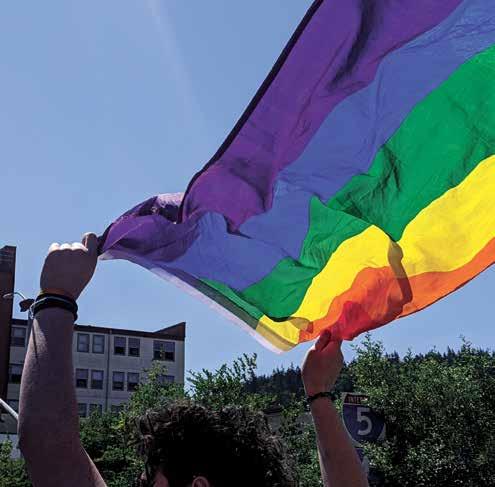
Night. Tickets include a free Pride shirt. Part of the proceeds go to Oasis Youth Center in Tacoma. To purchase tickets, go to https://fevo-enterprise.com/event/ RPrideNight.
July 6
Bellingham Pride
July 6–7
Bellingham will host two days of special events to celebrate Pride, including a family picnic, an all-ages dance, and the Bellingham Pride Parade!
“From its humble beginnings consisting of six to eight ‘pop-up’ day shades in Fairhaven Park in 2002, Pride in Bellingham celebrates 22 years,” said Betty Desire of Bellingham Pride. “Twenty thousand ‘Hamsters joined in the revelry of Pride 2023, and we are well on the way to surpassing that attendance this year!”
For more information, including a list of all the Pride-themed events in Bellingham during June and July, visit https:// prideinbellingham.org/2024-events.
July 13
Tacoma Pride Festival
12pm–6pm
Tacoma Pride Festival is back and filling the streets with entertainment, food, and vendors. For those 21+, there is also a block party at the Mix, with DJs and drag performances. To learn more, visit https:// tacomapride.org/prideevents.
July 20
Kitsap Pride
Time TBD
Save the date! Kitsap Pride is back at the county fairgrounds on July 20. More information to follow; check https:// kitsappride.org/ for updates.
Portland Pride
July 20–21
Portland will host multiple Pride events, including the Waterfront Festival, the Trans Pride March, an alcohol-free Pride party, the Portland Dyke March, the Pride Parade, and Gaylabration, a 21+ dance party. To learn more, visit https://portlandpride. org/2024-portland-pride-official-events.
August 16
Grays Harbor
August 16–17
Kick off Grays Harbor Pride with a free all-ages dance, then come back the next day for the Pride Festival. Enjoy vendors, food, and family-friendly entertainment. Stay into the evening for the free drag show! For more information, visit https://opghc.com.
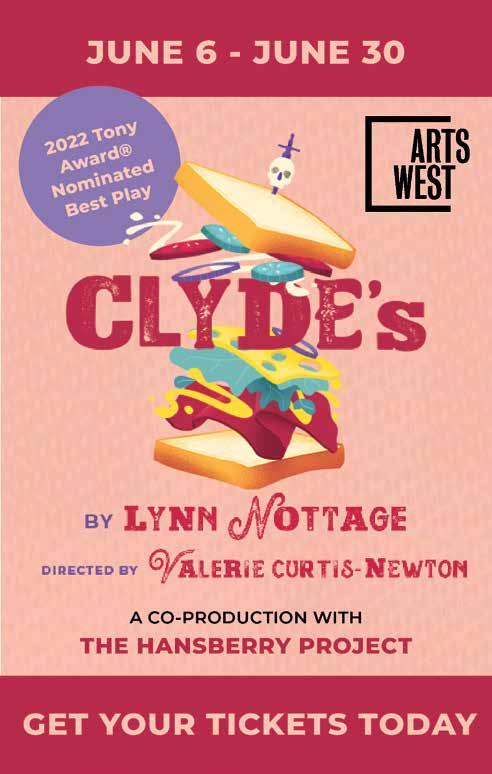
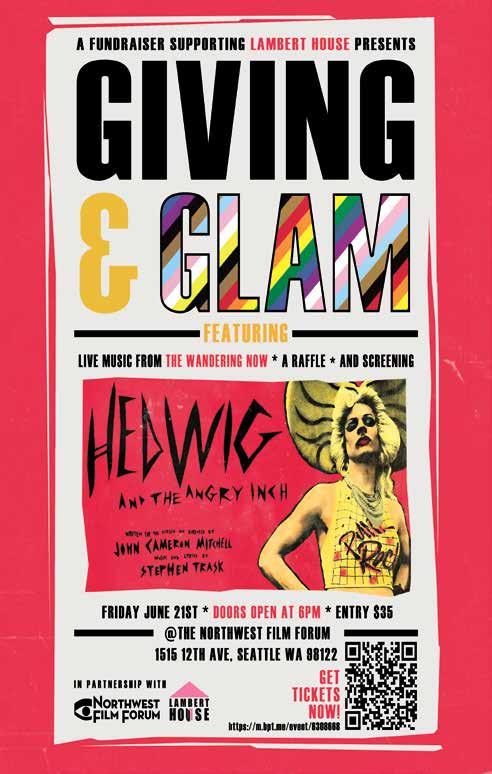





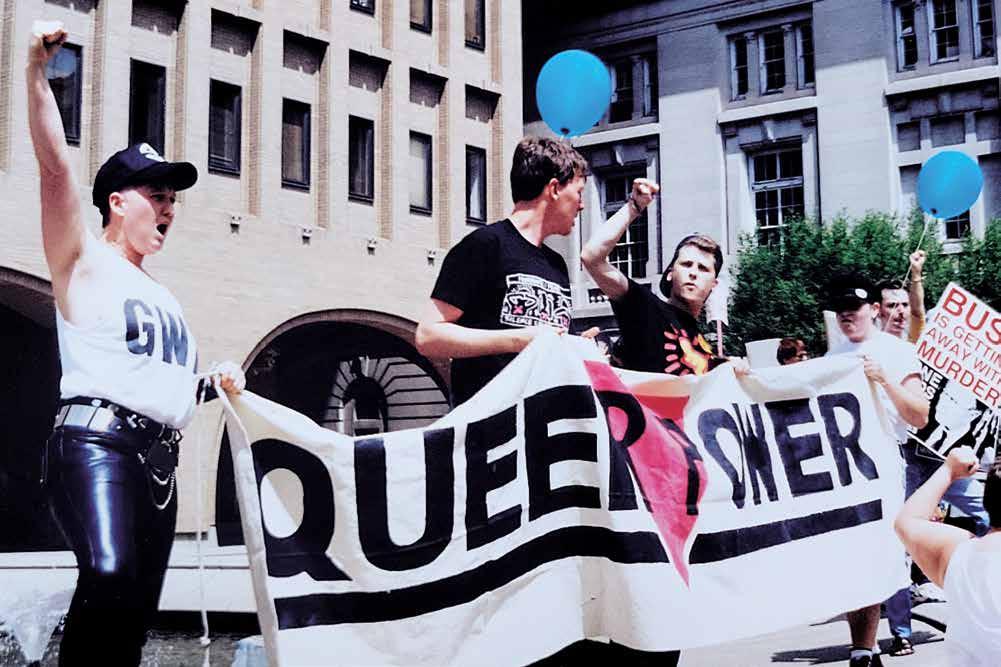

National Parks Service reverses policy banning uniformed workers in Pride parades
In mid-May, the National Park Service (NPS) banned employees from attending Pride parades in uniform, sparking outrage from both LGBTQ+ employees and the greater community. This reversed a long tradition of participation by NPS workers, who argued in response that Pride is about identity, not politics. (The NPS itself runs the Stonewall National Monument, commemorating the Stonewall riots of 1969.)
Facing backlash, the Interior Department reversed the policy on May 25.
Secretary Deb Haaland emphasized the importance of Pride and encouraged participation in Pride events while in uniform. Advocates remain cautious about how the new policy will be implemented, calling for safeguards against bias in approving participation.
Louisiana lawmakers pass
“Don’t Say Gay” bill banning classroom talk about sexuality, gender
The Louisiana Senate passed legislation on May 23 that would forbid school staff from talking to students in grades K-12 about sexual orientation or gender identity. Amid multiple similar bills passing in other states, Louisiana’s is so far the strictest.
Unlike a majority of similar measures, this bill puts restrictions on high schools, not just elementary and middle schools. It’s not just about classroom education either. Teachers and other school staff would be forbidden to discuss LGBTQ+ topics at clubs, sports games, or even school dances, and would not be allowed to disclose their own status as part of the LGBTQ community if they were.
Educators and other critics of the bill spoke out during a Senate committee hearing earlier this month, recognizing that the ban could likely send students the
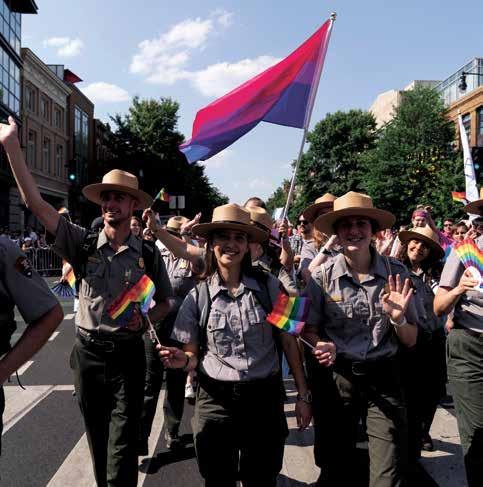
message that there is something wrong with LGBTQ+ people and force school staff and teachers into the closet.
Louisiana Gov. Jeff Landry is expected to sign the bill into law.
Idaho drag performer wins
$1.1 million defamation case against far-right blogger
On May 24, an Idaho jury awarded over $1.1 million to Eric Posey, an Idaho drag performer, after finding that a far-right blogger Summer Bushnell defamed him by falsely claiming he exposed himself at a 2022 Pride event.
Bushnell recorded Posey’s Pride perfor-
mance and doctored the video by adding a blurred spot over Eric Posey’s performance, falsely suggesting it covered his “fully exposed genitals.” This alteration created the misleading impression that Posey had exposed himself. While Bushnell’s defense maintained she believed Mr. Posey exposed himself, despite Bushnell herself admitting on the stand that she never witnessed the act, the unedited video showed no indecent exposure.
Posey faced harassment and threats following the incident, with the edited video becoming a symbol in a movement against drag queens and LGBTQ+ people. He expressed gratitude for the support
France: Karla Sofía Gascón becomes first Transgender actress to win at Cannes
In a historic moment on May 25, Spanish actress Karla Sofía Gascón became the first Transgender person to win at the Cannes Film Festival. The Emilia Pérez star accepted the Best Actress Award on behalf of the film’s ensemble cast (which includes Zoe Saldaña, Adriana Paz, and Selena Gomez) with an emotional speech dedicated to all Trans people and their tenacity, a story portrayed by the film itself.
Both a musical and a crime pic, Emilia Pérez follows the journey of a Mexican drug lord (Gascón) embracing her identity as a woman.
In her tearful acceptance speech, the 52 year-old actress said, “To every Trans person suffering every fucking day with hate...This is for you.” Then, addressing those who contribute to this hate, she said, “We all have the opportunity to change for the better, to be better people. If you have made us suffer, it is time for you to change.”
United Kingdom: Hundreds attend funeral of Brighton drag legend
Miss Jason
A funeral for Jason Sutton, who performed as Miss Jason for 32 years,
brought together hundreds of mourners in Brighton on May 23. Sutton passed away at age 56 on April 22 following an illness.
The service was also livestreamed on Facebook and followed by a wake at local nightclub Legends. In a Facebook tribute, Legends described Sutton as “a beacon of brilliance in the Brighton LGBTQ+ community” and a “master of drag.” The post also added, “His unmatched wit and comedic timing made him a legend of the scene, loved by everyone who witnessed his artistry both in and out of drag.”
Across his long drag career, Sutton performed at Pride events across the UK, appeared on television shows, and made costumes for other drag queens.
Italy: Pope uses homophobic slur in meeting with bishops
According to Italian media, Pope Francis used a homophobic slur during a May 20 meeting with Italian bishops while reiterating that Gay men should not be allowed to become priests.
Reported in both the La Repubblica and Corriere della Sera newspapers, the 87-year-old Pope joked that there are “already too many “frociaggine” in Catholic seminaries now. In English, this term roughly translates to “faggot.” He is reported to have made this remark during the opening of the four-day assembly of the Italian Bishops Conference.
from his friends and community, which helped him through the ordeal.
The Kootenai County jury unanimously ruled that Bushnell’s doctored video was defamatory, and agreed that it had caused significant emotional distress and damage to Posey’s reputation.
In total, Posey received $926,000 in compensatory damages and $250,000 in punitive damages, as it was proven Bushnell either knew her claims were false or acted with reckless disregard for the truth.
After the verdict, jurors expressed their sympathy to Posey, and the North Idaho Pride Alliance thanked them for their decision, reaffirming their commitment to the LGBTQ+ community’s safety.
Missouri Republican candidate’s slogan: “Don’t be weak and gay” Valentina Gomez, a Republican candidate for Missouri secretary of state, posted a social media campaign video in which she ran down a street while wearing a protective vest and said, “In America, you can do anything you want, so don’t be weak and gay. Stay fucking hard.”
Observers noted that the 25-year-old candidate’s video was filmed in St Louis’s historically LGBTQ Soulard District. The post also tagged Andrew Tate, a British influencer, and his brother Tristan Tate, a kickboxer, who are set to face Romanian charges of human trafficking, rape, and forming a criminal gang to sexually exploit women.
In February this year, Gomez also posted a video in which she used a flamethrower to burn LGBTQ-themed books. “This is what I will do to the grooming books when I become secretary of state,” she said. “These books come from a Missouri public library. When I’m in office, they will burn.”
Her platform highlights her far-right views: opposing the “transgender agenda,” securing the Second Amendment, and rejecting vaccine mandates. She advocates replacing voting machines with paper ballots and requiring voter identification.

Corriere della Sera described how some present at the meeting thought that the Pope, whose first language is Spanish, was unaware of how offensive the word really was.
Since becoming pope in 2013, Francis has insisted that the Catholic Church should be open to the LGBTQ community. Just last year, he remarked on the faults of laws that criminalized homosex-
uality, and said that priests could, in fact, conduct blessings for same-sex couples under certain conditions.
A Vatican statement on May 28 said that Pope Francis “never intended to offend or express himself in homophobic terms, and he extends his apologies to those who were offended by the use of a term, reported by others.”
Each June we celebrate the Stonewall Rebellion through a kaleidoscopic set of events. I have participated in these for a half-century. This year, as democracy is on the ballot, with liberty in the balance, I will be less celebratory and more cautionary, less optimistic and more pragmatic.
As a gay educator and historian, I bear witness to us dancing to a memory of Stonewall, often forgetting, ignoring, or rejecting these rebellious Queers’ gritty agendas and street tactics. Now, when most needed, their manifestos of sexual freedom are but dust blowing in the wind.
What might we learn from this Stonewall history and its aftermath in the era of Trumpism?
Heirs to the early 1950s Mattachine Society’s socialist founders, these Gay liberationists, Lesbian feminists, and transvestite revolutionaries advocated sexual freedom. Albeit short-lived, Stonewall was the predicate for the first March on Washington — just as the radical Mattachine Foundation had created an opening for the assimilationist Mattachine Society, the first national Gay organization, which was active through the 1960s.
Stonewall radicals’ messages of “Gay Is Good,” manifestos like “Woman Identified Woman,” Gay Liberation Fronts in 36 states, and Gay Liberation Day marches transformed public awareness and sparked activism among Queers — as well fears among national women’s and religious groups.
In 1977, singer-activist Anita Bryant’s Save Our Children campaign successfully overturned Florida’s Dade County’s antidiscrimination ordinance. Like dominos, referenda initiatives in other cities repealed similar ordinances. California’s Proposition 6 promised to ban homosexuals (and their allies) from public school work. It was rejected at the polls in 1978, crippling antisexualist momentum while galvanizing Queers. The next year, when at least 75,000 people marched on Washington, Lesbians and Gay men held elective state and federal offices, 24 states had repealed sodomy statutes, and multiple municipalities and counties had enacted nondiscrimination ordinances.
Coupled to an emergent AIDS crisis, sexual minority organizations mushroomed in midsize cities during the 1980s. I was active in Columbia, SC, as were many others in fledgling groups throughout the country. During this first decade of AIDS, President Reagan abjectly failed to address the public health crisis, and his administration provided meager funding (the 1986 budget proposal reduced funding by 11%).
Outreach efforts were further crippled by the 1987 Helms Amendment prohibiting any federal monies to “promote homosexuality.” The situation did not require more lobbying; it demanded direct action. A new iteration of Queer radicalism emerged.
During this age of madness and malaise, the AIDS Coalition to Unleash Power (ACT UP) confronted those deemed complicit. The largest protest since the Vietnam era shuttered the Food and Drug Administration for a day. Activists chained themselves inside the New York Stock Exchange to protest AZT’s exorbitant price. Other anarchic actions among loosely the confederated 148 chapters occurred in inland states and small cities. Meanwhile, mainstream national organizations painted a mural of humanity on the interminable wall of heterodoxy distancing degeneracy from decency.
The effectiveness of direct action coupled to conventional tactics was apparent: The Ryan White CARE Act, enacted in 1990, provided federal funding for people with AIDS, who also

What might we learn from this Stonewall history and its aftermath in the era of Trumpism?
gained access to experimental treatments; funds for needle exchange and emergency housing were also available. As in other civil rights struggles, in this brief but critical moment, radicals roused assimilationists, intensifying the struggle.
Such synchronicity, however, was rare — nationally or locally. After years of lobbying Congress, national Gay and Lesbian organizations settled for President Clinton’s compromise “Don’t Ask, Don’t Tell” policy in 1993, creating more problems for many uniformed Queers.
Showdown in Rehoboth
In Washington, DC, the Washington Post Magazine ran the headline “Showdown in Rehoboth,” where the homeowners’ association of this Delaware beach town had distributed bumper stickers pledging “Keep Rehoboth a Family Town,” in the face an “invasion” of Queers. While teenage vigilantes terrorized the fledgling Queer community, local Gay leaders collaborated with city officials to deescalate tensions. These leaders also joined homeowners in support of the raid on a Lesbian-owned shop that housed and discretely sold sex paraphernalia while ACT UP–inspired Lesbian Avengers marched to “free the toys.”
Engaging in earnest dialogue and sharing heartfelt experiences, Rehoboth Gay leaders sought to “Create A More Positive Rehoboth.” They believed that sharing relevant “harm-related personal experiences” rather than disgorging “facts” was more likely to foster respect for those holding different views on moral issues, especially if there was willingness and ability to communicate.
Changing attitudes
Attitudes gradually changed. Gay men were elected to local office, and homeowners selected progressive leaders. Nationally, the 2003 Lawrence v. Texas Supreme Court decision overturned sodomy statutes, Congress repealed “Don’t Ask, Don’t Tell” in 2010 and, 12 years later, President Biden signed the Respect for Marriage Act before vacationing at his Rehoboth Beach home. For progressives, it appeared that the “arc of the moral universe is long, but it bends toward justice.”
Unitarian minister Theodore Parker had originally penned an earlier version of this quotation in his 1853 sermon published seven years before Lincoln’s election and the onset of America’s first Civil War. During this era of brother fighting brother and communities divided, blood-stained battlefields were our only common ground.
Historically, violence in America is a constant — as is our unbending faith in the arc of justice. Bending this occurs when disparate forces for social change align. It is most fully realized when those divided by deeply held convictions enter the public square with mutual respect, a willingness to listen, and an openness to new information, as was the case in 1990s Rehoboth. Despite Parker’s optimism, these conditions were nonexistent during the 1850s, then evidenced in violence along the Kansas border and within the old Senate chamber. Nor do they exist today.
Since Donald Trump descended into American politics, the public square has shrunk. Furthermore, hate crimes have increased against synagogues, mosques,
temples, and churches, along with family planning clinics, Queer bars, drag queen story hours, as well as against those who are Black, Asian, Latino, or LGBTQ+. Far from being “lone wolves,” these attackers, like those of Jan. 6, were fed from a MAGA menu of falsehoods, fears, and fantasies. Capitol rioters turned “political prisoners” have found support from packs of patriots, alt-right pundits, apocalypse-based churches, and Trump acolytes.
These so-called defenders of freedom seek a return to the era before the Civil Rights Act of 1964, Stonewall, and Roe v. Wade. Policing the body politic is well underway. Municipalities and states prohibit drag events, the teaching of sexualities, DEI initiatives, and a family’s freedom to determine medical needs of a Trans child. To further restrict women’s control of their bodies, judges have resurrected 19th-century federal Comstock laws, dusted off century-old abortion bans, and prohibited IVF procedures.
The Republican Congress has endorsed a national abortion ban and the Life at Conception Act as we await the Supreme Court’s ruling on the “abortion pill.”
Hannah Arendt famously observed one can do evil without being evil. We do evil by acting justly yet benefiting from injustice. We do evil by ignoring our slow boil into fascism. We do evil by clinging to an illusion of normalcy. Perhaps, the Day One dictatorship promised by Trump and his enablers will be forestalled by their loss in this fall’s elections. Perhaps, the National Popular Vote Interstate Compact will be ratified, ending the undemocratic spectacle of presidential winners losing the popular vote. Perhaps, a victory by the incumbent president will not result in a repeat of January 6 — or worse.
Perhaps not.
This year’s Stonewall events should be a time for preparation, not celebration.
Dr. James Sears is a historian and educator. His latest book, Queering Rehoboth Beach, has just been published by Temple University Press.
The common “bro,” in many circles, has been a subject of constant derision. The term can be shorthand for a straight, cisgender man whose primary concerns are partying, fornicating, and otherwise upholding a rigid “frat house” brand of masculine expression.
But few non-bros can honestly say that they’ve been immersed in bro culture as an outsider. Until my junior year of college, I certainly couldn’t; I would’ve been most readily classified as one of the weird, nerdy kids in high school, and at UC Santa Cruz, I opted for the “substance-free” dorm halls.
But at the beginning of my third year, I narrowly managed to land a large bedroom on the top floor of an off-campus duplex. Six other men were living there: a young professional; two soccer jocks; a party animal, majoring in business; his buddy, majoring in computer science; and one who proved to be a good friend to me.
I’ll refer to this friend as “Tiger,” since that was the fursona species I assigned him when he asked for my opinion on the matter.
A peace offering Tiger wanted to talk to me, but I couldn’t fathom why. He’d caught me lingering in a common area as I was changing out my laundry and picking through a mass of detergent pods that had congealed in their container.
“Hey dude,” Tiger said. “You like books, right?”
I answered with a vague affirmative. It wasn’t the first exchange I’d had with him, but I was fresh out of a bad breakup, and any apparent desire for closeness was, to my wounded heart, worthy of suspicion, contempt, or both.
With the care of someone trying to coax a skittish animal toward a morsel of food, Tiger placed an old paperback on the banister and said, “This is for you.”
I don’t remember the book’s title, because I never claimed it — but this did prompt Tiger to call me out on my hesitation and ask why I was so standoffish. At the time, I didn’t have an answer for him.
He left that book sitting on the banister for a few days before he found me again and brought up the genre of wuxia fiction. Discussing modern East Asian martial arts fables finally convinced me that Tiger and I weren’t from different “tribes” after all. In fact, he was about as nerdy as I was, but he had a much denser physique, due to his genetics and his rigorous fitness routine (hence the name).
Before I met Tiger, I knew very little about cooking, drinking, pumping iron, or even proper nutrition for an active lifestyle. The most I had regularly cooked for myself before college was the odd jumbo-sized omelet when I got home from school. A full meal plan at the dorms hadn’t helped matters.
One of the first lessons I learned from Tiger was how to butterfly, season, and cook a chicken breast on a skillet. He also introduced me to protein shakes, a wide variety of beers and bars, and the many wonders of Grocery Outlet. With his guidance and encouragement, I took up weightlifting, ending a sedentary period that had lasted two years.
I owe a great deal of that year’s newfound happiness and confidence to Tiger, and I believe his experience with the more positive aspects of bro culture made him a natural guide — an ambassador, or perhaps a medium, between myself and the bros in the building. That role became crucial to my immersion experience when I was invited to the other bros’ first party of the year. The venue was our house.
A sore thumb
I’ll refer to this bro subject as “Shades,” since he wore sunglasses indoors. Before you judge him, he deserves at least some

Few non-bros can honestly say that they’ve been immersed in bro culture as an outsider. Until my junior year of college, I certainly couldn’t.
credit for making an effort to include me in his recreation. He was also kind enough to offer me my first-ever alcoholic drink, an IPA I prayed wasn’t exemplary of beers in general (for the sake of my upcoming trip to Ireland).
As I sipped on my drink, standing in the kitchen and staying vigilant for any changes to my state of consciousness, partygoers started to trickle in. In retrospect, I was unfashionably early.
The theme of the party that night was “Kidz Bop.” To honor it, I had gone so far as to throw on a bright red windbreaker and a green They Might Be Giants T-shirt. But as guests filled their Solo cups at the plastic bin of “jungle juice” — a Frankenstein’s Monster of cheap spirits, fruit juice, and soda — I realized that I was the only one wearing actual prescription glasses.
Statistically, I thought, there had to be others in attendance who needed corrective lenses. But it seemed that, for this occasion, they had unanimously chosen to wear contacts or fly blind.
I grew more and more self-conscious, lingering in each throng, hearing the most vapid jokes, and watching with fascination as everyone laughed. I wasn’t drunk enough to be having as much fun as they were, I guessed; the others had evidently been drinking before they arrived.
Tiger emerged from his room just as I was deciding to retreat to mine. He offered to be my “wingman” for the event, pointing out a trio of women sitting on the foldout couch underneath the Notorious B.I.G. poster.
”Do you think they’re cute?” Tiger asked.
I said I did.
“Wait for my signal,” he said. “I’ll scope it out and introduce you. Got it?”
I agreed to the plan, despite my growing anxiety, and tried to act natural while keeping an eye on the exchange. I don’t remember it clearly, but two of the women stood up and went elsewhere before Tiger beckoned me over. I sat down next to him.
To the remaining woman, whose attention was firmly on her phone, Tiger introduced me as something like this: “This guy is a writer. He’s like a young J.R.R. Tolkien. He’s gonna write the next great American novel, trust me. He’ll tell you all about it.”
Tiger nudged me with his elbow, said, “I’m gonna grab a drink,” and left.
I was mortified — not at the idea of talking to a woman, mind you, but at how prodigiously I had just been hyped to the stranger sitting across from me. At that point in my life, I had never finished even a rough draft of a short story, much less a full-length novel.
I didn’t end up talking about my novel. Instead, my ostensibly incomparable mind manufactured the sentence “So… you taking a break from all the action out there?”
Whatever that meant.
Bro-gender presentation
Shades and I shared a wall with each other, and a large bathroom. The walls of our house had little soundproofing to speak of, so during my stay, I became intimately familiar with my neighbors’ habits and routines — whether I wanted to or not.
A few nights a week, Shades would have a woman over to watch a show and have sex. I’m unsure if his guests were a different person each time or a rotating roster.
RDNE / PEXELSTheir voices made it clear there were multiple, though I only saw one with my own eyes, as she was leaving one morning. When asked, Shades did agree to keep the noise of his encounters down after midnight on school nights, so this particular habit wasn’t a problem for me. I mention it because it fits like a cog into the bro archetype he so carefully projected.
His most common attire was a tank top, expensive sunglasses, basketball shorts, and sneakers whose brand and model I never cared to check. He kept his hair short, and carefully shaped with product. When addressing me, his friends, or one of his guests, he spoke with a vocal fry — a creaky, breathy tone, at the lowest possible register. He endeavored to carry himself with the ease of a man who was too cool for the world.
When addressing his mother, however — as Shades routinely would, over the phone after his showers — his voice was much closer in tone and pitch to mine. The first time I heard one of their calls, I could hardly believe it. Most people do change their tone of voice in different contexts, but Shades had gone beyond a simple code switch. It was as if he wasn’t “out” to his mother as a bro yet.
I still think about that revelation, and how it softened my view of Shades and, by extension, my view of bros in general. No amount of sympathy would be enough to excuse toxic behaviors, but the harm of the bro hegemony, as I saw it in that house, seemed to be directed inward.
If gender is a performance as much as an identity, then being aware of that fact could empower a person to “live their own truth.” I have no way of knowing for sure if Shades felt truly at home in his own skin when he was bulking on testosterone boosters, or croaking to his friend, “Come on, man. Don’t be a trog.”
But I do know that he was a textbook case, and as with so many archetypes, one size rarely fits all. If brohood was not Shades’s truth after all, and he hasn’t since moved on, I mourn for the young, soft-spoken man who felt he had to hide behind the Ray-Bans. I hope he finds his way into the light someday.
Get ready to groove through 50 years of LGBTQ+ history! To kick off Pride Month, “Pride Anthems: A Vibrant Musical Journey from 1969 to Today” on June 7 will evoke the struggles, heartache, resilience, and joy of Queer lives then and now.
With music direction by Brian J. Nash, the concert will feature John Cameron Mitchell, best known as co-writer and star of the musical Hedwig and the Angry Inch. The other vocalists in the show will include Bistro Award winner Amy Jo Jackson, Broadway performer Marty Thomas, and Kevin Smith Kirkwood, who recently appeared in an off-Broadway production of Kinky Boots
From Donna Summer, Queen, and George Michael to Erasure, Madonna, and
Lady Gaga, the songs promise to transport the audience from disco to the present day. The story of the fight for LGBTQ+ equality is linked to this music.
The nonprofits Pride Live and Seattle Symphony will co-produce the “Pride Anthems” concert, but note that the Seattle Symphony Orchestra will not perform in this program. A portion of the proceeds will benefit Pride Live and the Stonewall National Monument Visitors Center, which will open later in June.
The Pride Anthems concert will take place at Benaroya Hall on June 7, 8 p.m. For tickets and more information, visit https://seattlesymphony.org. For information about Pride Live and the Stonewall National Monument Visitors Center, visit https://pridelive.org.
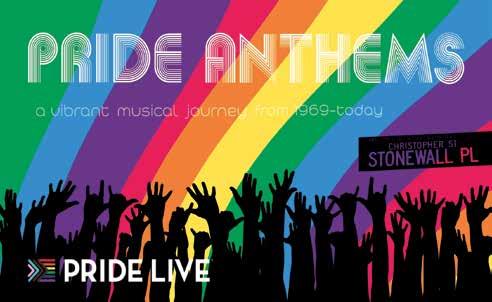
John Cameron Mitchell joins a powerhouse lineup of vocalists, including Broadway star Marty Thomas, for a concert of 50 years of Pride anthems, from Donna Summer, Queen, and George Michael to Erasure, Madonna, Lady Gaga, and others. The story of the fight for LGBTQ+ equality is linked to this music, evoking the struggles, heartache, and liberation of Queer lives then and now. “Pride Anthems” is a show designed for all ages to come together in song and celebrate the LGBTQ+ community.
I had a chance to chat with two Broadway/Gay Icons, Mitchell and Thomas, via email. (As a reminder, it was Thomas who beat Britney Spears on Star Search in 1992.)
On being back in Seattle:
John Cameron Mitchell: We had to cut off our [2020] Origin of Love Tour, sadly. I used to crowdsurf — I hope I wasn’t a superspreader! I was also doing live listening marathons for my podcast musical Anthem: Homunculus. Everything shifted for live performances. We still haven’t fully recovered audience-wise. My main mission to get people back into rooms together. It’s one of the best antidepressants!
Marty Thomas: I was actually here a few months ago, boarding a cruise ship I was entertaining on. I’ve been so fortunate to visit Seattle several times, performing with tours and with my solo act over the years.
On the “Pride Anthem” concert: JCM: They just reached out! I guess they’re doing a lot of West Coast towns and lassoed me into the biggest one, Seattle. And I’m excited to visit Bellingham for the first time!
MT: [Pride Anthems musical director] Brian Nash, who I’ve hosted and performed with for over 20 years, asked me what my summer looked like. He told me the concept of the show, and buttoned it with Amy Jo Jackson and Kevin Smith Kirkwood having signed on. Tour the country singing some of my favorite music with some of my favorite people? Count me in!
“Pride Anthems” is an anthology of the music that has quite literally defined the LGBTQIA+ movement since the movement was at all visible. We are singing disco, show tunes, pop, rock, and everything in between.
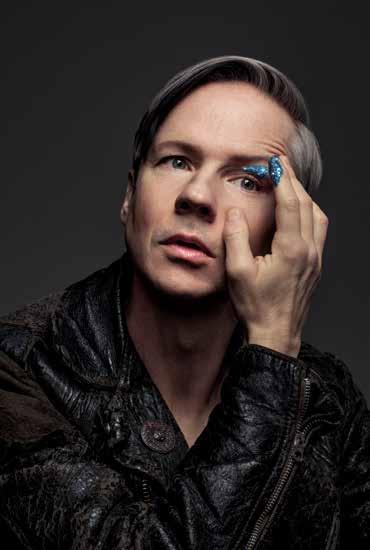
It’s so important to shine a light on how difficult the Queer liberation and equality journey has been, how far we’ve come, and how much further we have to go.
On favorite Gay anthems:
JCM: Well, Amber Martin and I do a retrospective show called Cassette Roulette and sing a lot of what I call alt-Gay anthems, including “Small Town Boy” by Bronski Beat, which was a dance hit when I was coming out in the ’80s. In the ’70s I loved all the Queer icons — Freddie Mercury, David Bowie, Lou Reed, Barbra Streisand, and Barry Manilow — and I do their songs on tour. Some may pop up in “Pride Anthems”! MT: I always come running for disco and the holy trifecta: Celine, Whitney, and Mariah. I also never met a show tune I didn’t like.
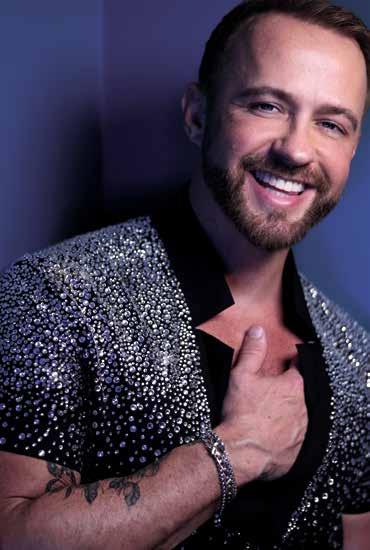
What is Pride?
JCM: Pride was first time a boy whistled at me on the street. I love being objectified. Of course, that was in the time of AIDS, and Pride has always been a political party to remind folks that the misfits are not alone and that we deserve respect.
MT: Pride is who I am. I’ve been an out Gay artist since I really felt like an artist. It definitely wasn’t as easy in the ’90s when I was coming up in the industry, but it was so much harder for Queer artists that came before me. Everything that was made more gentle for me came at their expense, and for that I’m forever grateful.
I had so many mentors to look up to and to guide me, primarily my big sister Julia. I think having another Queer kid in the family was just as comforting then as it is now.
It’s fascinating to have watched the journey of Queer culture, to see how far we’ve come and the ways that artists are able to safely and freely express themselves in 2024. I’m proud to be a small link in that chain.
“Pride Anthems” is providing me a brilliant platform and very intentional space to reflect on how proud I am of who I am today, through music.
“Pride Anthems” hits Seattle’s Benaroya Hall on Friday, June 7. For tickets, visit https://seattlesymphony.org. The concert is produced in partnership with Pride Live, which will apply some of the proceeds toward the Stonewall National Monument Visitors Center, which will open next month. Visit https://pridelive.org to learn more.
In celebration of Pride Month, Seattle Opera will host a special crossover recital by local drag queen Anita Spritzer (also known as operatic tenor John Marzano) on June 27, called “Divo to Diva: Anita Spritzer in Recital.”
Spritzer will bring her big wigs, bold personality, and beautiful tenor voice to the musical program, which will feature pieces from across the opera and musical theater traditions — by Leonard Bernstein, Giacomo Puccini, Richard Rodgers and Oscar Hammerstein, and others — alongside a few comedic surprises.
Marzano, whose sweet, lyrical singing entranced audiences in Handel’s Alcina last October, most recently appeared as Spritzer at the company’s “Queens of the Night” Halloween party.
“Combining my two worlds of drag and opera has always been a dream of mine, because it shows how much the two art forms have in common,” said Marzano. “Giving this recital during Pride makes it extra special for me, and I want it to be a reminder of what Pride is all about: a constant fight for rights and acceptance, as well as a celebration of who we are.”
Marzano described the event’s relaxed format as “not your average recital and not
your average drag show.” Audiences should dress to express, and drag is encouraged.
Community and youth events
For another opportunity to celebrate, Seattle Opera’s young patrons’ club, BRAVO!, will host an end-of-season party on June 7 at Capitol Hill’s Century Ballroom. The event will include a set of beginner flamenco workshops and a performance by local troupe Oleaje Flamenco.
An additional June event might interest SGN readers: On June 21 and 23, participants in the Jane Lang Davis Creation Lab, Seattle Opera’s workshop for local composers and librettists, will showcase the new works produced during their multimonth development projects. Four 20-minute operas will receive their world premieres: a story based on Andean legend, a tale of generational divides and family dynamics, an explosive portrayal of fed-up climate activists, and an invitation to a dystopian capitalist hellscape.
Seattle Opera will also offer summer opera camps for teens, tweens, and young children.
“Divo to Diva: Anita Spritzer in Recital” plays on Thursday, June 27, at 7:30 p.m., in Tagney Jones Hall at the Opera Center. For tickets and more information about all Seattle Opera summer programs, visit https://seattleopera.org.
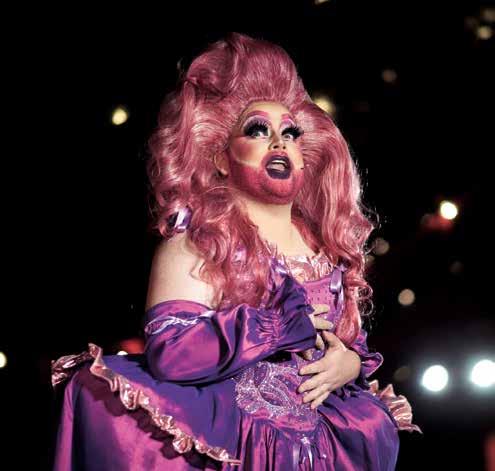
“It’s seamless”: How Shannon Roudhán and Jason Bowlsby embrace creative chaosBY LINDSEY ANDERSON SGN STAFF WRITER
Shannon and Jason have the magic touch — they can make something out of nothing! The two Seattle-based makers share a passion for crafting, which they have been doing their whole lives. “Both of us come from crafting families,” Jason said.
“We were raised by makers, people who make things for a purpose,” Shannon explained “and that crosses into what we do. Everything is made with a purpose. We were raised by people who came from the Depression — makers. That’s where our background came from, so when it comes time to express ourselves, this is how we do it. We create using whatever the heck is in front of us.”
For the Shannon and Jason, making includes a wide variety of crafts, from quilting to crocheting to sashiko (decorative reinforcement stitching) and everything in between. “The world has changed, and people are multicrafters. They just want to do things for the sake of doing it,” Shannon said. “People ask what our business is, but it is everything: graphic design, photography, cooking.”
After falling in love 30 years ago on the dancefloor of the Timberline, a oncebeloved Gay bar where the current Cornish College for the Arts’ Raisbeck Hall is located, Shannon and Jason decided to come together in a crafting partnership and started their business. Now, they teach classes, give tutorials, commission art, and write crafting books.
Shannon and Jason have different talents and skill sets, but their business works because they know what they are good at and have passion for their work. Jason typically handles the photography while Shannon does the tactile work. “Shannon always has to have her hands moving,” Jason said. “I have to do something, or I am maddeningly bored,” Shannon added. “I’m always working on something. Embrace the creative chaos, that’s our thing. It’s our idea that there’s so much stuff going on, and we have the choice of fighting that chaos or embracing it and creating with it.”
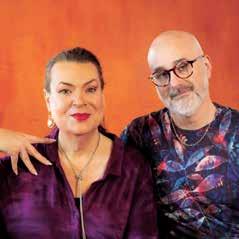
Together, Shannon and Jason are changing the way people see crafting. For them, the magic is in the process of transformation. There is freedom in crafting without expectations. Sometimes, new crafters will get caught up in the functionality of what they make, but the secret Jason and Shannon have found is that things don’t have to be useful to have a purpose.
“I have no purpose for this except I like how the colors look,” Shannon said as she held up a square of different fabrics sewn together. What was once just scraps is now a gorgeous piece of art.
“Our last book was about Japanese embroidery — you’re counting threads and making designs by weaving fabric — and these are small things, and it’s like, ‘What do I do with that now?’” Jason continued. “You look at it. You enjoy it. It’s art. It’s something to be enjoyed, looked at, and sometimes touched and felt. Sometimes, the creation is the destination.”
Embracing the chaos helps Shannon and Jason find balance, not only in their business but in their personal lives. They add crafts to their repertoire slowly, trying not to take on more than they can chew. “There is a constant flow. We go where the current is taking us,” Jason said. “After a while, you can only fight so hard against that cur-

rent, and eventually, you have to let go and see what’s around the bend.”
“The balance is seeing it’s all one thing,” Shannon added. “It is a magical thing, to plant a seed and see food come off it. You do the thing that’s there. It’s all a part of the same energy and the same chaos.”
While so many Americans live in the “profit over passion” mindset, Shannon and Jason have found a way to make both work. “You can be creative and get paid for it. This is how Mama pays the mortgage,” Shannon said with a laugh. “We don’t have to like that we live in a capitalist society, but we still exist in it, and I still have to pay my mortgage and keep the lights on. There’s the balance between being a socially conscious creator and also taking care of us and our community.”
Shannon has advice for anyone hesitant to take the leap and pursue their creative
passions as a career: “Just do it. Stop thinking about it and just do it. Stop planning to live your life, and just live your life.”
Embracing the chaos not only helps Shannon and Jason uphold a successful business and follow their passions, but it is also their philosophy for their relationship. “We have been through all the changes. We’re growing together as two people,” Jason said. From shifting business models to changing economies to the personal growth that comes with transitioning, Shannon and Jason have stuck together through it all.
“Working together and being a couple — it’s all the same thing,” Jason said. “I couldn’t do what I do without her assistance. We have our own spaces, but we’re still constantly talking to each other, like a play that never ends. It’s seamless between the two of us.”
When fans think of the greatest cities for comedy, Chicago, New York, and Los Angeles come to mind. Although significantly smaller, Seattle has a growing underground Queer comedy scene that is on the rise, thanks in part to a handful of producers behind the scenes.
In September 2023, Seattle comedian and iTunes chart-topper Andy Iwancio founded a small open mic at Capitol Hill’s Comedy/Bar. The mission of “Queers to the Front” is simple and explicit: for one night each week, local and visiting Queer comedians get priority to practice new material in a safe and hate-free space.
“I founded the QTTF mic because I thought it was important for there to be a space to hear these marginalized voices in a neighborhood that is historically LGBTQ+,” Iwancio said. “I wanted it to be in a comedy club, because I wanted these folks to also get a feel for what the larger scene is like. This kind of mic could be easily isolated and not have a place for the comics to move up.”
Comedy/Bar filled a hole left behind after the long-time venue Jai Thai closed its doors for good on Capitol Hill. Open seven days a week and now equipped with a functioning elevator and stage ramp, Comedy/ Bar brings some of the country’s biggest names in comedy to the stage, but starting at 8:30 p.m. on Monday nights, it is home to the future of stand-up.
At the end of 2023, Iwancio handed off the reins of the evening to the next generation of Queer comics looking to get into production. The weekly show is now produced and run by local comedians Ian Crowley and Molina Molina, the latter of whom was featured at San Francisco Sketch Fest and Upper Left Comedy Festival.
“I put the mic on entirely by myself for a few months. That it has grown in the hands of Ian and Molina is great,” Iwancio said. “It feels like I’ve helped in a substantial way. Also, I am stoked to be able to pop in, see things going well, and dip out without having to clean up cups or do rudimentary math with money or write down people’s names. Basically, just never using anything I learned in kindergarten is chill.”
“Inheriting the mic from Andy Iwancio and getting to run it week to week has been a pleasure,” Crowley told the SGN “It has provided me with networking opportunities with other comedians and producers in the scene, and I love the people who frequent the mic. Having a spot for cool Queer comics to work on their jokes every week has cultivated an incredible atmosphere for writing, performing, and being in community with other Queer comedians in the city.”
“There’s a demand for Queer comedy in Seattle,” Molina added, “as seen with the success of shows and festivals that have featured local and touring Queer performers, such as Safeword Comedy, Wet City Comedy Festival, and Flock. Over the past year in particular, more local Queer shows have been in the works, and I hope it continues, because there’s some amazing Queer talent in Seattle that deserves to be highlighted.”
Not only does “Queers to the Front” offer an alternative experience free from toxic male shock comedy, but the show is also working to incorporate a variety of styles and performers. Regular performers range from comedian Rich Snyder, who stepped onto the stage for the first time in his sixties, to newcomer Jone DeHuff, who spent their 21st birthday performing stand-up at the LGBTQ+ open mic. “Queers to the Front” has also started branching out with additional talent. On Monday, May 13, it included caricature artist Dennis Connors, who added a second layer of entertainment to the weekly jokes and jabs.
“As one of the ‘Queers to the Front’

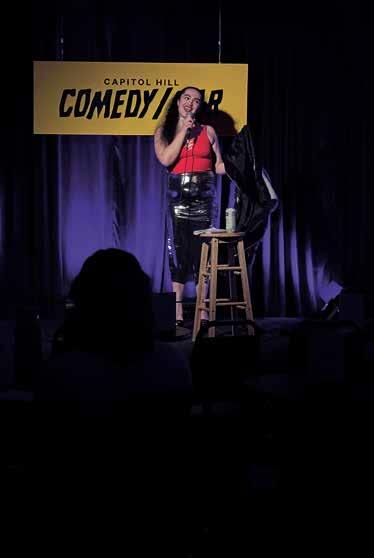
producers, one of my goals is creating an experience, and not just a show,” Molina said. “I want it to be a space where Queer folks can connect and have a space where they feel included. Those kinds of spaces have always been ones that I’ve gravitated toward as a fan of comedy.”
“Queers to the Front” has developed a cult-like following, not only with regular performers but also dedicated fans, who show up to sit in the audience week after week. The audience is just as much a part of
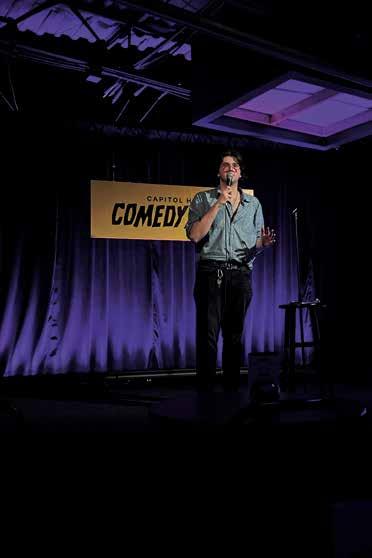
the show, using their laughter — or lack of it — to communicate which jokes are funny and which should stay in the notebook.
It’s also a safe space for fans who may be hesitant to attend a regular comedy show, safe from Trans, Queer, disabled, or feminine people being used as the butt of the joke. The space has also become a haven for comedians to find community and friendship.
“’Queers to the Front’ is the place that always feels like a safe zone for me as
a Queer comic,” Seattle comedian JoJo Blacco said to the SGN. “The producers of the show never made me feel like anything other than family The spotlight that ‘Queers to the Front’ gives to Queer community and people who love comedy is so refreshing.”
Tickets are available online at https:// www.comedyslashbar.com/events/82712 or at the door, with a suggested donation of $5.
 BY SARA MICHELLE FETTERS SGN STAFF WRITER
BY SARA MICHELLE FETTERS SGN STAFF WRITER
I was there 19 years ago for the birth of Three Dollar Bill Cinema’s TRANS|lations Film Festival. I helped program the first few, and even conducted an engaging Q&A after an archival screening of the 1986 comedy Something Special, aka Willy/ Milly, at the Northwest Film Forum one year. Needless to say, this is one festival that’s near and dear to my heart.
Never in a million years could I have predicted just how much TRANS|lations would evolve and mature over the years. With a virtual component running June 6 through 9 and with the in-person component taking over Columbia City for two full days (June 7 and 8), this year’s fest brings an excellent international selection of narrative features, documentaries, and shorts to Seattle audiences. There’s even a special event at the Seattle Art Museum.
Other highlights include the world premiere of Noah Arthur Woods’s I Do This for a Living, a gala opening night screening of Jules Rosskam’s Desire Lines, and even a groundbreaking collaboration with the Melbourne Trans Film Festival, TILDE. The whole lineup showcases just how much TRANS|lations has grown over the years while shining a spotlight on Trans creators from all across the globe.
I sat down to chat over the phone with Festival Director Anto(n) Astudillo about this year’s TRANS|lations. Here are the edited transcripts of what they had to say:
Sara Michelle Fetters: We’re back for the 19th annual TRANS|lations Film Festival. You’re now officially the festival director. Congratulations! What’s your excitement level right now?
Anto(n) Astudillo: I am super excited. … Last year I was the lead programmer, so I was only focusing on…viewing, rating, and picking films, and reaching out to distributors. Just purely programming work. This year, as the festival director, I got to experience the entire [process]: logistics, production, organization, administration, everything that a festival involves.
I had to bring my experience… [from] like 10 years ago, [when] I was an international producer for this theater festival in Chile, in Santiago. I produced there for seven years in a row, and I brought all of that [to being] TRANS|lations festival director. That meant reaching out to not just filmmakers but also the artists involved, the

screening committee, and making sure that the Three Dollar Bill Cinema board could help me in all the different areas that the festival involves, from marketing to event production, promotion, volunteers — you name it.
It was definitely a challenge. But I took the challenge very happily, because I really love this festival and I really love…our Trans and gender-diverse community in Seattle. I was really excited when I was offered this opportunity.
SMF: And one of those challenges this year is that the festival is a month later than its traditional spot, which I would assume is because of the Seattle International Film Festival taking TRANS|lations’ normal early May place on the calendar. What kind of challenges did that present as far as scheduling and programming?
AA: Yeah, and we start running into Pride too…in June....Usually…you always want to try to have your festival at a time where nothing else is happening, because you want people to come and watch the films and come to your events, but that’s never the case. …
I think the challenge is to be able to reach out to folks and do some community outreach and make sure that we’re helping each other to uplift all of our programming. I think that’s the biggest challenge of moving the festival to a different month of the year.
SMF: You were very excited last year about having so much of the programming in the Columbia City neighborhood. At the time, you were like, “I kind of dream that maybe we can just take over Columbia City and have that be the home base for the festival.” Lo and behold, one year later, it does feel like TRANS|lations is doing that for the entire weekend.
AA: It’s exciting. I didn’t know how the reception was going to be from the audience and from people in Columbia City [in 2023], but this year, again, we’re in Columbia City, and we’ve expanded beyond what we did last year. This year I contacted local bars, like Lottie’s Lounge, which is going to be the TRANS|lations spot to go to after screenings on Saturday…[to] have a conversation if they want to take a moment [and] get together and hang out….
We’re again having our opening night party at the Royal Room. We’re super thankful. We will have performances and a DJ playing that night, so it’s going to be super fun.
We’re back at Ark Lodge Cinema, and we’re using the two [houses] on the bottom floor, so they’re wheelchair accessible...
Then we’re also using the Beacon. We really like the fact that we get a lot of independent films at TRANS|lations, and those have a really good reception at the Beacon, because their year-round programming fits really well with this program. But, also, we can show a more explicit program, a kinky program, at the Beacon as well. This was something that the screening committee really wanted once again this year.
SMF: But you are also expanding opening day by having an entire short film event at the Seattle Art Museum on Friday afternoon. Could you tell us more about that?
AA: Yes! I’m so excited that the Seattle Art Museum [is letting] us to have a screening event at [its]…huge auditorium — it’s 296 people, so this is bigger than our opening night event.
For that, I thought a perfect way to begin this collaboration was to show the program “Queer Futures,” which is coordinated with Multitude Films, a production company that has produced four wonderful Queer and Trans films. They’re also focusing on our BIPOC community.
I was just really excited to share this lineup with them, this special program that we’re having... Most of the directors are BIPOC. It really just highlights the excellence of our Trans community of creators. Our screening community was super excited to show some of those films. I was like, ‘Let’s just show them all! We can show them at the Seattle Art Museum.’
The museum is also really excited about this collaboration. We really hope we can continue to show work there or have events at the Seattle Art Museum in upcoming years.
SMF: Even though this is a relatively
short festival, you still have managed to schedule a number of Pacific Northwest premieres, local premieres, and even a world premiere, I Do This for a Living. Why this film?
AA: I feel like…a lot of our filmmakers…[from] our Trans community, our gender-diverse community, are looking for venues to show their work. Most of them are creating work that is honestly brilliant…, but they’re not finding distributors and venues. …And that speaks to [the fact] that we still have a lot to do for our Trans and gender-diverse community of creators. We’re having a conversation about this on opening night with a panel of our Trans community of creators.
I Do This for a Living…is beautiful. … The director, Noah Arthur Woods, a Nonbinary artist, wanted to find a space. The screening committee loved the film; we all did. It’s autofiction: [it] portrays their own life, their own relationship with their family, and their relationship with a Trans woman that plays the part of their partner. I think it just makes sense to have this film at TRANS|lations. This is something that I keep trying to tell all of our creators that I reach out to when I want to show their films at TRANS|lations: ‘We have the community, and we have an audience that is mostly Trans and gender diverse that are really going to appreciate your work.’ I think people realize this and love it when we can make it happen. In a similar way, we made it happen with Desire Lines too.
SMF: This is its Pacific Northwest premiere, and that’s your opening night presentation. And you are going to have the director Jules Rosskam here, who will be the 2024 Transcend Award winner. What went into that decision, and how excited are you to bring them here for opening night?
AA: First of all, I wanted to say that after talking with the committee and realizing becoming 19 years old as a festival also makes us a grown-up and wiser, we decided to, in an effort to decolonize traditional uses of language within our industry, [change] the name from Trailblazer Award to Transcend Award…
This is our second year giving an award to a notable artist in our industry. Last year we gave it to Isabel Sandoval, and this year I’m really excited to give it to Jules Rosskam. The reason why we picked Jules is because Desire Lines …highlights the story of Queer revolutionary author and
 BY SARA MICHELLE FETTERS SGN STAFF WRITER
BY SARA MICHELLE FETTERS SGN STAFF WRITER
FURIOSA: A MAD MAX SAGA
The first time I saw George Miller’s Mad Max 2: The Road Warrior (released in the US without “Mad Max” in the title), I honestly could have cared less. It was the summer of 1981, and I was thrilled that Smokey and the Bandit II was back in theaters, as we’d missed it the previous year. I was obsessed with the first Smokey and the Bandit, thought Burt Reynolds was about the coolest guy this side of Harrison Ford, and hadn’t the first clue who Max Rockatansky was. Suffice it to say, while I was happy my parents had surprised me with a Sunday trip to the theater, I was only excited about one half of the afternoon’s double feature.
When we came back outside, all I wanted to talk about was The Road Warrior, and all thoughts of Reynolds, a desert climax featuring an armada of big rigs battling it out with Sheriff Buford T. Justice, and a cute baby elephant had disappeared entirely from my memory. No, it was all Max, the Feral
the Gyro Captain, Humungus, the psychotic villain with the colorful mohawk (I’d only later learn the character’s name was “Wez”), Pappagallo’s wickedly cool car, and a rampaging ending unlike anything I’d ever seen before. I was so enamored with the picture that my dad took me back to see it — and only it — two more times before it ended its run a few weeks later.
As much as I like Mad Max Beyond Thunderdome and adore Mad Max: Fury Road, I have not felt that immediate, stratospheric, oh-my-gosh-how-the-heck-did-he-do-that sort of high when walking out of Miller’s dystopian cinematic world since (although the latter nearly got me there). The filmmaker throws up sights and sounds like no one else. His skill at orchestrating mindbending action is undeniable. The way he crafts a concrete, instantly authentic world of utter madness is extraordinary.
But that instantaneous feeling of giddy euphoria? That hasn’t happened since The Road Warrior. That is, until now, until after watching Furiosa: A Mad Max Saga
I’m not going to make the case that Furiosa is “better” than either The Road Warrior or Fury Road. I’m not sure I can. But what Miller achieves? The scope of his vision?
The sheer Wagnerian size of it all? I’m dumbfounded. This prequel is a master class in storytelling and directorial vision that evokes Greek mythology, the spaghetti Western, grind house postapocalypse drive-in extravaganzas, old-school Hollywood melodrama, and classic film noir, all of it confidently pulverized into a breathtakingly eye-popping mélange of cinematic bravado that left me speechless.
Split into five chapters, this prequel begins with a young Furiosa (talented newcomer Alyla Browne) being kidnapped from the Wasteland’s seemingly last remaining “green place” and delivered to warlord Dementus (a never-better Chris Hemsworth), a wannabe post-apocalyptic Alexander the Great who never encountered a precious resource that he couldn’t greedily overuse to oblivion. It moves from there to the teenage girl’s introduction to Immortan Joe (Lachy Hulme), commander of the water-rich Citadel and leader of an army of so-called “war boys,” who will all unquestioningly sacrifice themselves for his benefit at the snap of a finger.
The next three pieces involve a now twentysomething Furiosa (Anya Taylor-Joy) working for Immortan Joe and learning all

she needs to know to survive — and thrive — in the Wasteland from a determined road warrior known as Praetorian Jack (Tom Burke). It all builds to a final face-off with Dementus, who longs to get his hands on the Citadel and its resources no matter the cost. But while Furiosa rightfully wants her revenge, she’s also plotting to get back to the Green Place, and if that means doublecrossing Immortan Joe, so be it.
Everything in this prequel is fully fleshed out and meticulously built. The relationship between the Citadel, the Bullet Farm, and Gas Town is documented down to the last detail, with rhapsodic efficiency. Characters introduced in Fury Road as colorful accessories to the war of wills waged between Max, Furiosa, and Immortan Joe are given vivid, idiosyncratic details that make them come alive as never before here. There is an elephantine grandeur to events that’s unlike any other installment in this series, with comedy, drama, horror, and action all mixing on the canvas as if they were a Jackson Pollock masterpiece.
While nothing about this opus could ever be construed as boring, it does take about an hour for Miller to unleash his first massive, almost 20-minute set piece. Furiosa has stowed away on Immortan Joe’s War Rig and finds she needs to partner with Praetorian Jack when a bunch of Dementus’s former warriors go rogue and attack without warning. Likely shocking no one, the director delivers an array of sights, sounds, and vehicular pyrotechnics that defy belief. It’s unreal.
And it all only gets better from there. Even as years pass and Furiosa transforms into the unstoppable Imperator she will become, Miller keeps the gas pedal firmly pressed to the floor. Emotions are big, bold, and deliciously larger than life. The operatic majesty is like something out of Sergio Leone’s The Good, the Bad and the Ugly or Once Upon a Time in the West. The showdown between Furiosa and Dementus is well worth the wait. As for the final scenes, the moments that bleed from this prequel directly into the three days and two nights of a high-octane, kinetic free-for-all are perfect.
So, yeah, I was giddily euphoric exiting Furiosa. When I finally did put a few thoughts together, I found I was speaking with a gleeful urgency I seldom have immediately after a screening. This is Miller’s world, and I’m ecstatic I’ve been lucky enough to be around to experience every single second of it. What a rush!
The first time I watched 1974’s Thunderbolt and Lightfoot in the early 1980s I had no idea what I was in for. What did I know? It starred the Man with No Name, Clint Eastwood. It had Jeff Bridges, the guy who disappeared into a video game and became a digitized hero in TRON. It was the first film directed by Academy Award winner Michael Cimino (The Deer Hunter), currently on the outs in Hollywood due to the box office crash and burn of the epic Western Heaven’s Gate Mostly I knew my dad loved it. All of that was more than enough for me to give the flick a chance when I snatched the VHS tape off the shelf from the downtown Spokane library.
What did I get? An incredibly strange buddy-action-heist-comedy that concluded in spectacular tragedy, a cross-dressing Bridges, and what I could only surmise was an unspoken romance between its two stereotypically masculine leads. The homoerotic subtext was so obvious, I could only surmise that Cimino had purposefully put it there, and I was shocked my conservative father had never noticed it. But I did. The drama’s final scenes were so hauntingly devastating that I had to retreat to my bedroom so my parents wouldn’t see me cry.
The film more or less begins with Eastwood laying low by impersonating a smalltown Montana preacher and escaping an assassination attempt by a slimy nobody while he’s in the middle of a sermon. That’s quickly followed up by Bridges’ motormouthed car thief literally running over the killer and then offering the fleeing padre a lift. The former turns out to be a well-known bank robber referred to only as “Thunderbolt,” while the young hot-rodder goes by the moniker “Lightfoot.” In the time it takes a Mustang to go from zero to 60, the pair become fast friends.

In a series of events that makes textbook movie logic but in the real world would be unbelievably goofy, the dead guy trying to murder Thunderbolt was part of his former gang, and the two remaining members (the perfectly cast George Kennedy and Geoffrey Lewis) are as equally homicidally angry. Somehow, not only are the pair convinced to let bygones be bygones but they also get convinced to redo the exact same heist they pulled years prior, right down to the 20mm cannon that gave Thunderbolt his nickname. Lightfoot enthusiastically goes along for the ride.
It’s a quirky film. Eastwood has rarely been better, his performance a subtle master class in reactive physicality and determinedly expressive facial gymnastics. But it is Bridges, in one of his finest early roles, who steals the show. This was the second of his seven (as of now) Academy Award nominations, and if he hadn’t been facing down Robert De Niro’s iconic work in The Godfather Part II, he would likely have
won the Oscar. Bridges is funny, pathetic, heroic, sympathetic, selfless, and proudly arrogant as Lightfoot, bouncing across the screen with such energetic euphoria that I couldn’t take my eyes off of him. All these years later, I still can’t. His fearlessness is infectious.
“Bromance” is a 21st-century term for cinematic male friendships, but it easily could have been coined during the 1970s if anyone had been paying attention (several titles come to mind, including Elaine May’s Mikey & Nicky, Richard Rush’s Freebie and the Bean, and Arthur Hiller’s The In-Laws). But Cimino, whether intentionally or not, appears to take things a step or two further. There is a striking eroticism to Eastwood and Bridges’ interaction, and the heat they generate is palpable. It all builds to a climactic moment of unexpected heartbreak that’s positively earthshattering, with Thunderbolt stoically holding back tears as he drives into the unknown with — spoiler alert! — a lifeless Lightfoot sitting in the passenger seat.
Eastwood has always been a perplexing risk-taker. He’s filled many of his films — both as an actor and as a director — with groundbreaking depictions of race, gender, and sexuality that pushed taboos and busted the conventions of their time. But he’s also utilized egregious stereotypes and centered examples of sexist excess that are decidedly unsavory under the best of circumstances, unforgivably rancid at their worst. Heck, he followed up this film with one of the more blatantly homophobic endeavors of his entire career, 1975’s The Eiger Sanction, whose depictions of homosexuality have aged so poorly that the otherwise exhilarating mountain-climbing thriller has sadly (and infuriatingly) become almost impossible to watch.
The counterpoint is that Eastwood has never been one to play it safe, and by allowing Cimino the freedom to make this film his own, it gave the actor one of the more daringly emasculating roles of his career. This, along with his work in Play Misty for Me, The Beguiled (both 1971), and High Plains Drifter (1973), two of which he directed, showed how willing the screen icon was to shatter his movie star image. While Thunderbolt and Lightfoot never openly express their affection for one another, it’s clear with how one gazes possessively at the other (and vice-versa) just how mutual their silent attraction is.
Even if you leave all that at the door and choose not to analyze the subtext, Thunderbolt and Lightfoot remains a major achievement for Eastwood, Bridges, and Cimino. It deserves to be more than a cult curiosity. It has laughs. It has imagination. It has real drama, hard-hitting thrills, and several unexpected twists that make anticipating what is going to happen when delightfully difficult. If that’s not the very definition of “unforgettable,” I’m not sure what is.
activist Lou Sullivan, who [dedicated] his entire life [to] fighting for the rights of our Trans community. It was super important for me to …highlight the film [not only] by playing it on opening night but also by giving this award to Jules.
SMF: I’m really excited seeing this partnership that you’re having with the Melbourne Trans Film Festival. Can you tell us more about how that came to be and what audiences can expect from this partnership?
AA: I started getting calls from different Trans, Nonbinary, and gender-diverse curators and programmers…because they wanted me to help them with their own festivals. ...And then I got a call from TILDE, the Transgender diverse film festival in Melbourne. ‘What did you do last year? How did you do it? How do you put together a festival? How can we make things better for our community?’ That’s how we started talking. Then we realized maybe we should…exchange films?
So we’re really excited that they commissioned two short films…by First Nations creators from Naarm, which is the Indigenous name for Melbourne. I’m super excited to show this work. This is going to be [their] North American premiere... We get to…bring awareness of these creators [to our community], and also next year, … we’ll send two films to TILDE, and hopefully this is something that we can do every year. This most certainly will provide our artists with so [many] more people from other countries interested in their work, so much international presence. It’s exciting… I went to Melbourne…to the TILDE Film Festival, because I wanted to see
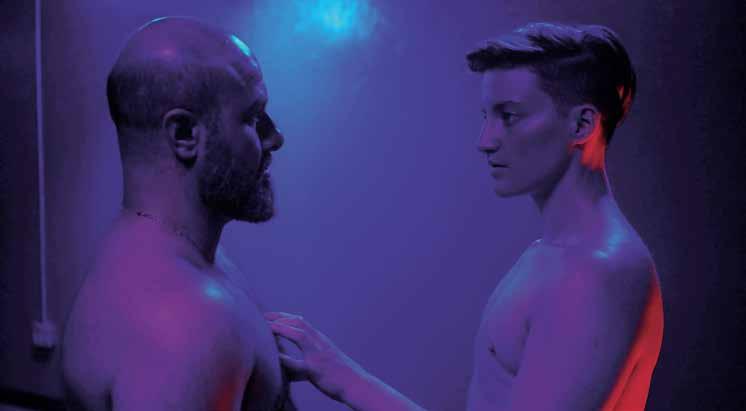
with my [own] eyes what they were doing. I wanted to learn, obviously, and I wanted also to create not just virtual connections but real physical connections with people. I met Maori Indigenous filmmaker Ramon Te Wake, who is from New Zealand/Aotearoa. I’m showing at TRANS|lations the three first episodes of her TV series The Boy, the Queen & Everything in Between, which is also a North American premiere. It is gorgeous. I really want people to see this work.
SMF: Finally, what do you hope audiences take away from this year’s festival. Also, how do you see TRANS|lations continuing to grow in the future?
AA: I think that what we can do as a Trans community…is that we can connect with each other. …Different Trans film festivals can connect with each other and work together and in the hopes that we can provide our Trans creators with a broader network of people and audiences, and help them grow as creators. So why do we have to be in our own corners in the world and not know about each other when we can actually work together and uplift the work of our creators?
I think, going [to Melbourne] provided a lot of hope. I feel like there is this…huge potential for our Trans community to have
our own festivals, our own industry, to be able to do work that we’re happy about and where we don’t have to sacrifice what we want to say for the sake of people liking it or not. You know what I mean? I see a lot of growth in the upcoming years.
The TRANS|lations Film Festival runs June 6 thru 9 with both virtual and in-person components. A full calendar of events and ticketing information can be found at https://threedollarbillcinema.org/ translations.
 BY LINDSEY ANDERSON SGN STAFF WRITER
BY LINDSEY ANDERSON SGN STAFF WRITER
When Steven Rowley published The Guncle in 2021, he had no idea how successful the book would become. The story — a former sitcom star turned recluse grappling with the grief of losing his best friend and sister-in-law while caring for her two young children — resonated with readers across the globe in a year when they too were dealing with overwhelming grief and confusion.
“To the extent that that was a character coming out of a very dark time, landing in a moment when, worldwide, we’d all been coming out of a dark year, I think there was something special that just resonated with readers,” Rowley said to the SGN
The Guncle received tremendous accolades for handling such an emotional topic with poise and humor. The year it hit shelves, the book won the Thurgood Prize for American Humor, adding Rowley’s name to a prestigious list of past winners, including Jon Stewart.
“I never really imagined it as more than a single book, until my thoughts kept turning back to the kids in particular,” Rowley said. “I think a lot of people assumed I missed Patrick, since Patrick is a lot of fun to write… but there’s a lot of Patrick in me. When I want to access Patrick, I can, anytime, but it was more the two kids. At the end of the first book, they were going back home to Connecticut to a home where their mother was no longer there. In many ways, their grief journey was just beginning at the end of that book, and I felt compelled to check in on the kids — are the kids all right? I wanted to know as much as anyone.”
The original Guncle book was inspired by one of Rowley’s favorites, Auntie Mame, as well as his real experiences as a “guncle” to five niblings, and the tragic loss of his best friend to breast cancer. “She left behind a six-year-old son,” Rowley recalled, “and so my eyes were open to the idea of what role friends and family and those left behind have in reminding a child of how deeply he is and was loved. There was a combining of those two things, coupled with a longtime passion for the Auntie Mame novels. I’ve always loved that character, and this was a way to do a modern interpretation.”
When thinking about a sequel, Rowley returned to Auntie Mame. “The sequel to the first Auntie Mame novel is a book called Around the World with Auntie Mame, so I sort of thought that if we revisit the characters, I’m going to find a way to take them overseas,” Rowley said. “So, that was a jumping-off point.
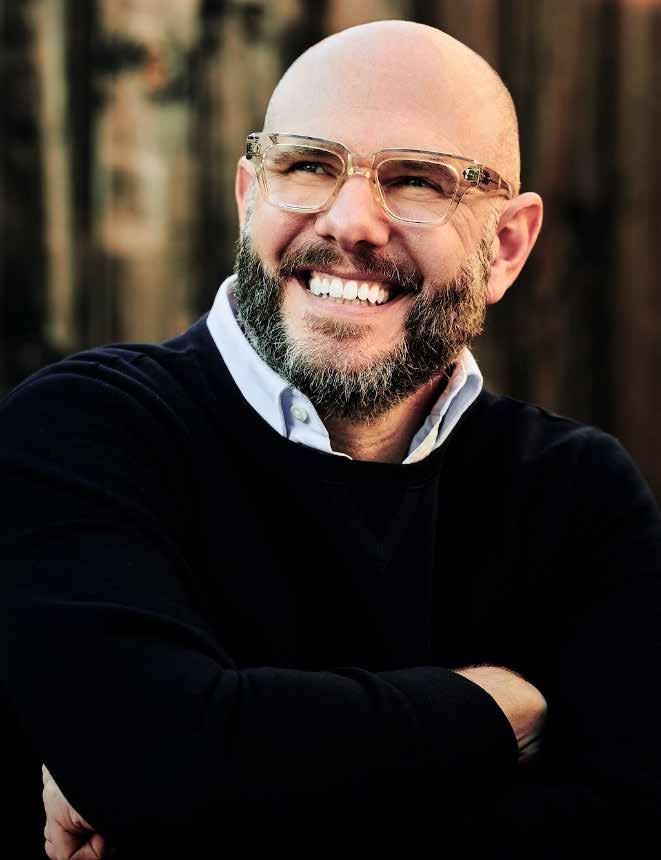
“I wanted to [say] in this book [that] even after loss, even with terrible grief, with time, there will be room for healing and celebration and joy in our lives again.”
The Guncle Abroad picks up five years after the events of the first novel, with Masie and Grant now 14 and 11. While Patrick, much like Rowley, expresses his disdain for sequels throughout the second book, Rowley clarifies that this one is not a cash grab. “I wouldn’t have done it if I didn’t think there was more story to tell,” he said.
Writing a sequel to such a widely successful novel was tricky for Rowley. “The first time around I could just write the book that I loved because there was no expectation on it other than expectations I placed on it myself,” he explained. “This time around, I felt the weight of not wanting to interfere with the passionate embrace that readers have for the first book. I didn’t want to do anything that might lessen the first book in their esteem. I still had to approach it as ‘these are my characters and I’m going to write the book I love,’ but I felt the tremendous responsibility to live up to the love of the first book.”
Humor Rowley also felt the responsibility to make sure the sequel lived up to the humor readers came to love in the original. “Balancing the humor and the heartbreak is the hardest thing that I do,” he admitted. “Sometimes it’s fine-tuning the balance. If you make one joke too many in a scene, it can throw off the tone you’re trying to accomplish, and conversely, if you go too long without allowing the reader to take a breath with a joke, with a laugh, it can otherwise go too dark, perhaps darker than intended.”
When writing the first novel, Rowley had to cut several jokes he loved. “You can write a joke you’re enamored with, but it slows down the action or it takes too long to set up, or it doesn’t fit within the context of the scene, and those are sometimes the most painful to cut,” he said. “I’ll wait two or three drafts before I go in with my red pen and [say,] ‘This has to come out.’ It’s not easy — sometimes it’s torturous — but I think I’m finding an instinct for it.” Rowley never forgets the jokes he has to cut out — and he keeps a list in his phone
of his favorite jabs, as well as potential blunders he’d like to see his characters experience. “I think one or two things were resurrected perhaps from the first book, but sometimes with time or distance, you realize something wasn’t as funny as you thought the first time,” he said. “Finding the humor in the new book came from the characters as they are now, the new situations, and the new dynamics that the three of them have together.”
The Guncle Abroad takes the heart and humor of the first story and magnifies it to a global scale. Fans of Patrick, Masie, and Grant will delight at the trio’s new dynamic and hilarious hijinks as they traverse the strange new world of adolescence (and Europe).
The book is now available everywhere. Rowley toured the country to celebrate the release and made special stops at Third Place Books in Ravenna and Charlie’s Queer Books.
